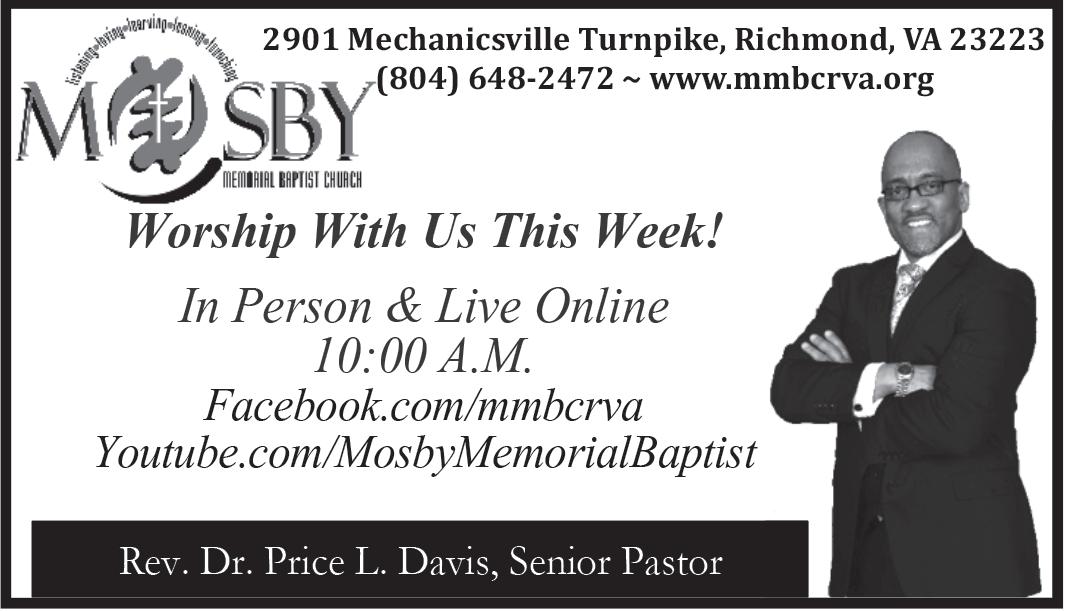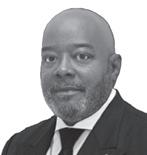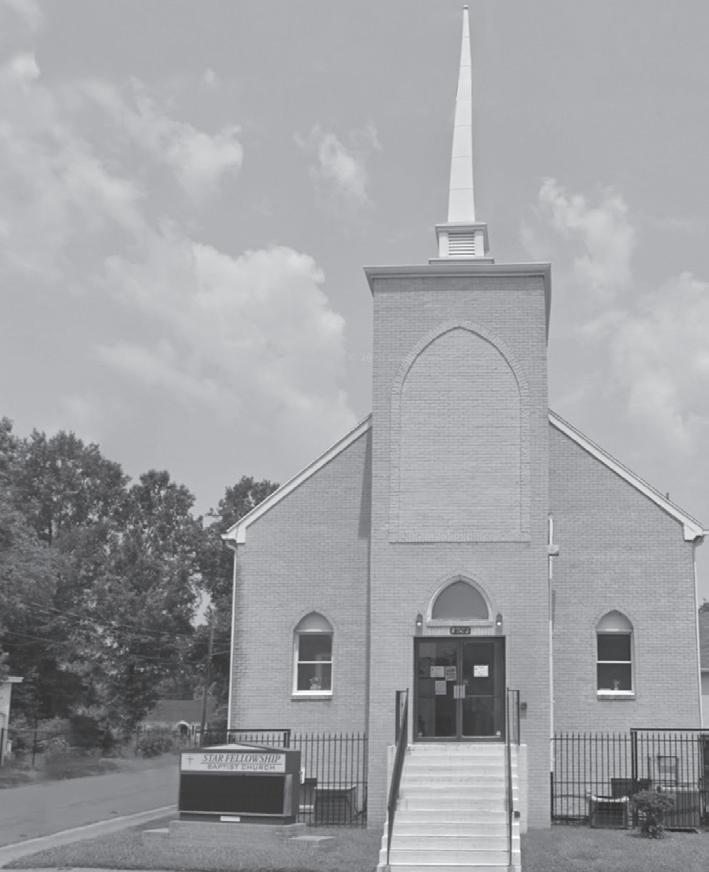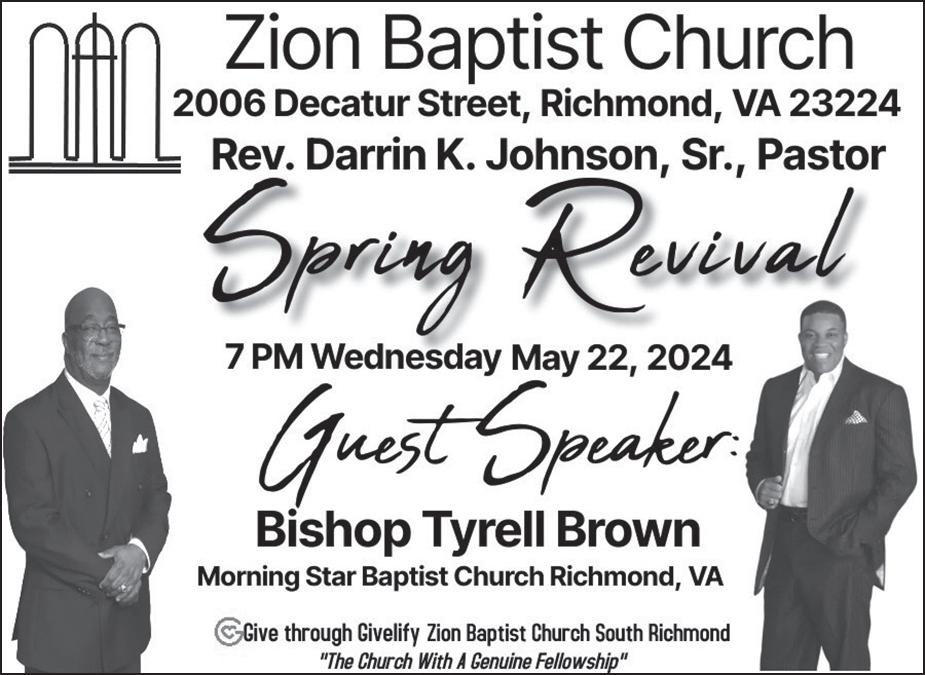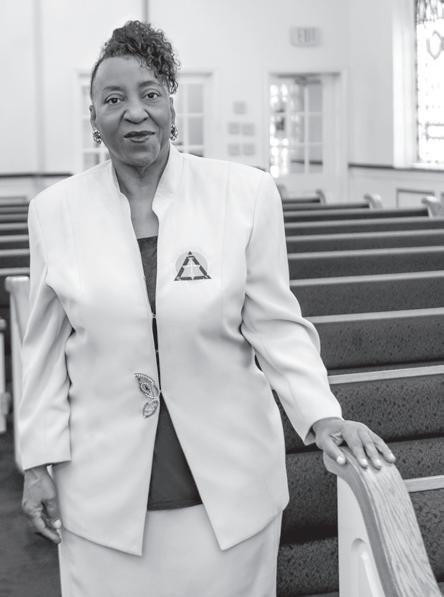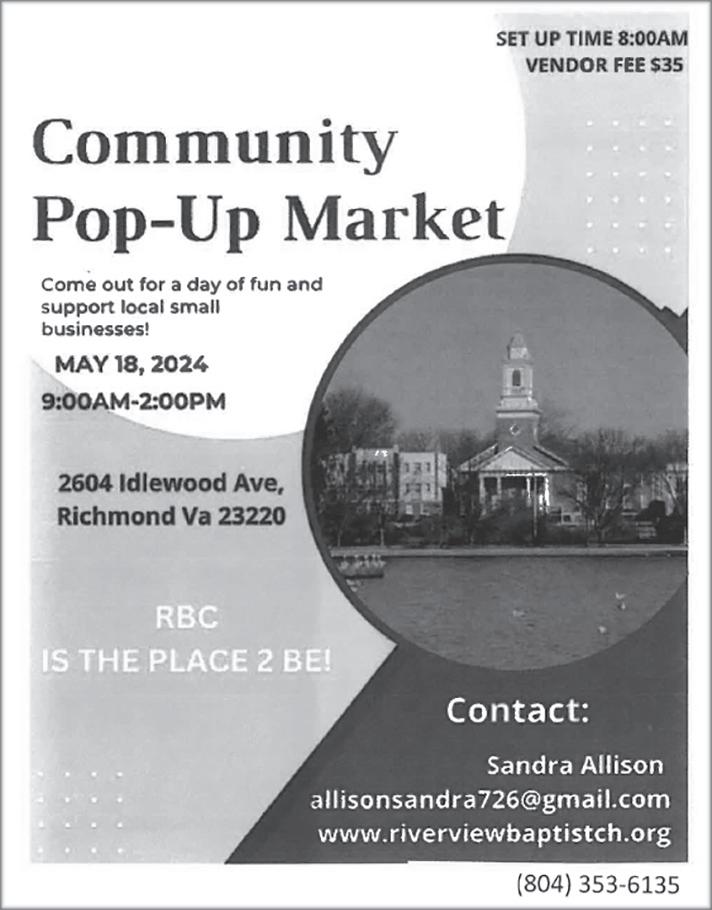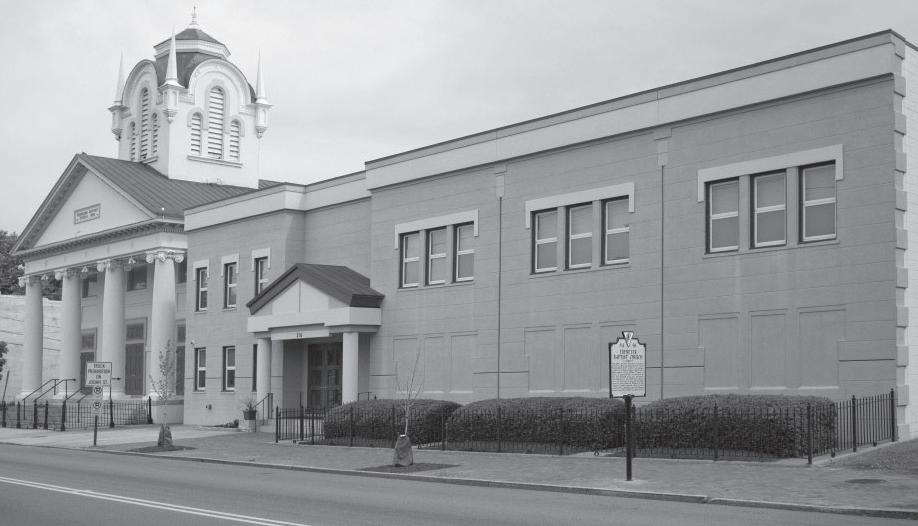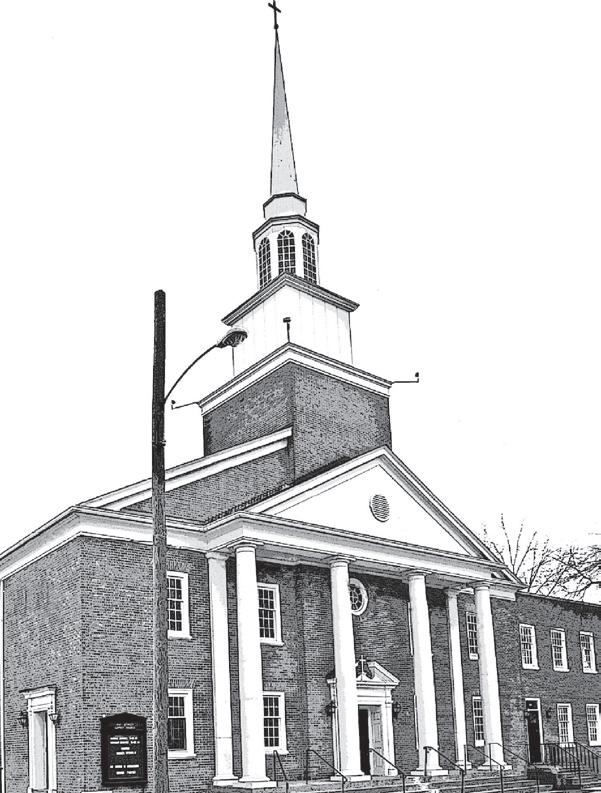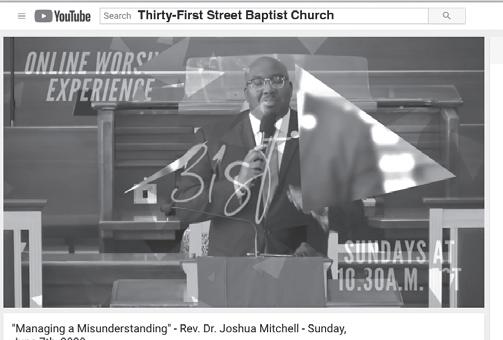




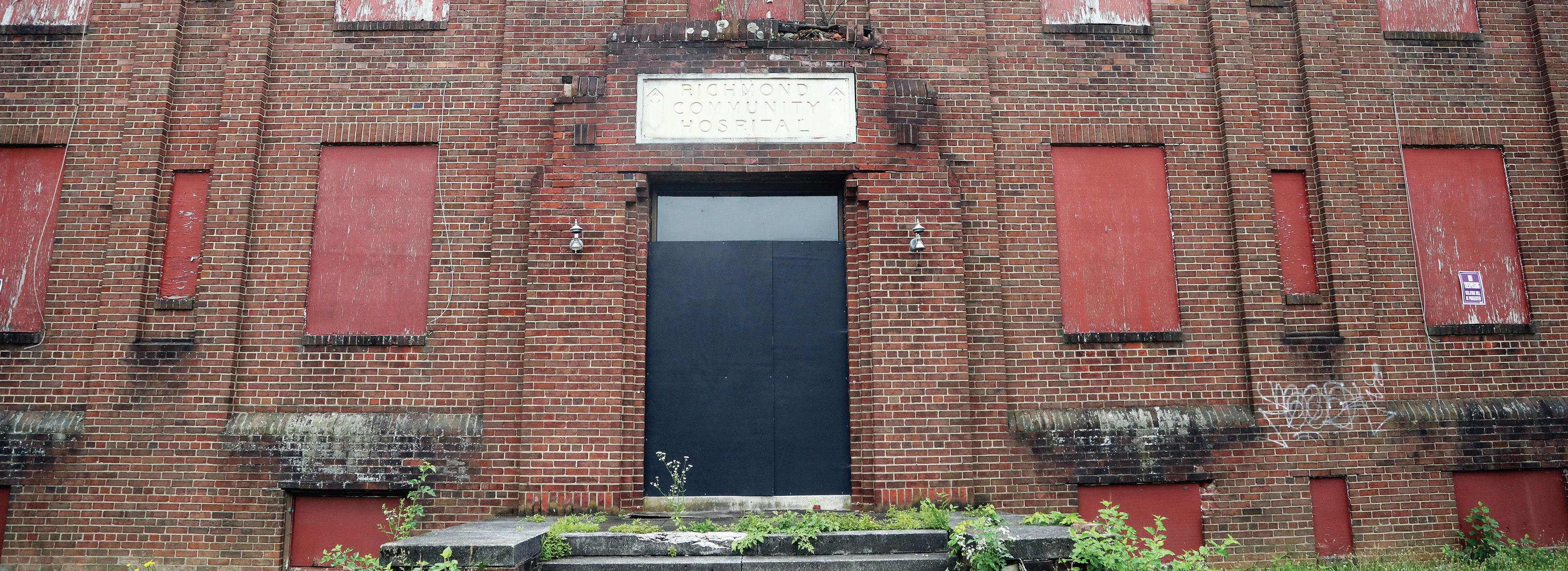
A key part of Richmond’s African-American history. A critical resource at a time of medical segregation. A place where many who worked, were born, or said goodbye to loved ones. And now, one of Virginia’s many endangered historical sites. Richmond Community Hospital was formally recognized as one of 10 endangered historic places in Virginia, as part of
Preservation Virginia’s annual list of buildings and locales at risk of decay, destruction or disappearance throughout the state. Members of the nonprofit group announced the list Tuesday morning at the Black History Museum and Cultural Center of Virginia. They were joined by representatives from groups who nominated the various sites included on the list and supporters of the sites themselves, including Viola Baskerville of the Save Community Hospital group.
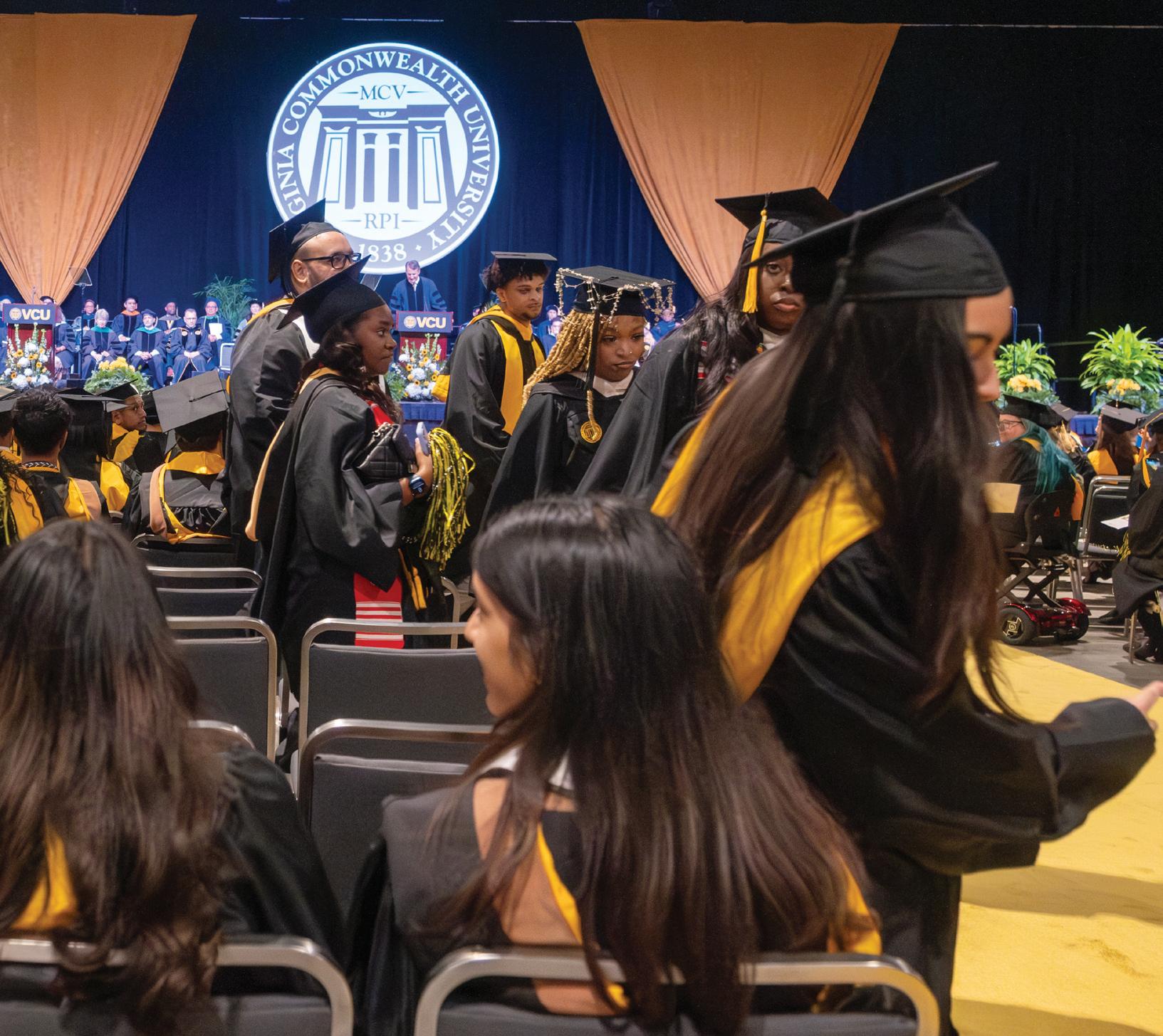
“These historic sites represent important spaces in communities throughout the Commonwealth,” Preservation Virginia CEO Elizabeth S. Kostelny said. “From Hampton to Roanoke, Loudoun County to Brunswick County, these historic sites are in need of awareness and assistance to ensure they are preserved for future generations.”
Commence the protest
College commencements across Richmond began in dramatic fashion over the weekend, as graduates drew attention to problems with their schools, their leaders and their treatment of students.
Last Saturday, over 100 graduates at Virginia Commonwealth University walked out of the university’s commencement ceremony in protest of its keynote speaker, Gov. Glenn Youngkin.
Gov. Youngkin’s speech, which focused on the roughly 4,700 graduates as conductors “composing (their) symphony” was drowned out by cheers from the crowd as students stood and exited the Greater Richmond Convention Center.
Some of those who left marched to Abner Clay Park, carrying signs that read “Youngkin
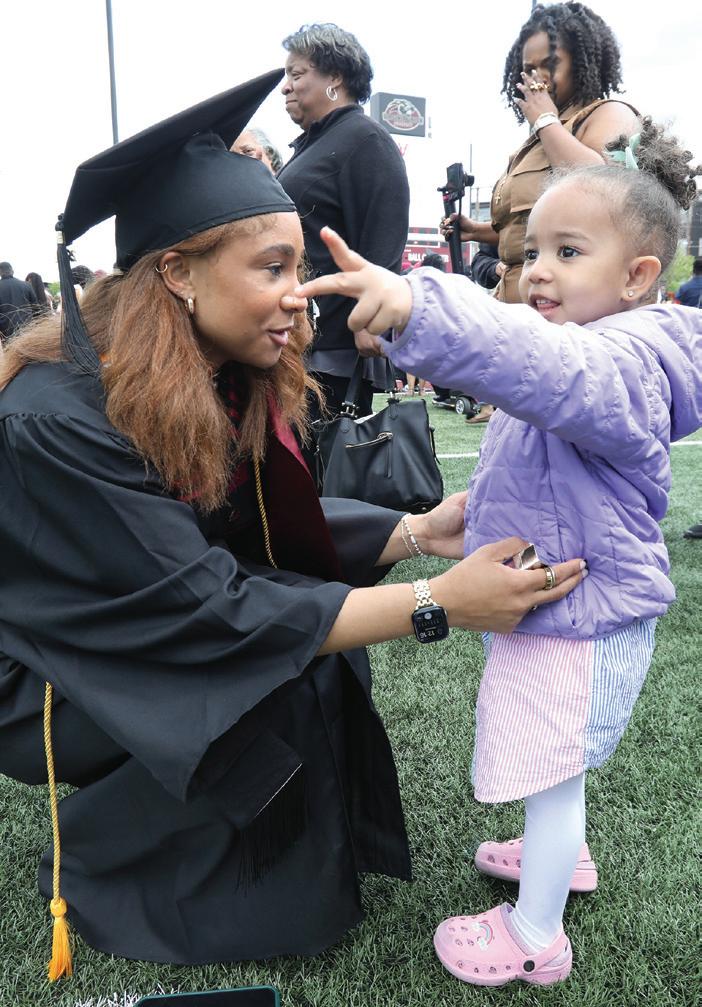
City Council approves Diamond District project, lawsuit follows
By George Copeland Jr.Richmond City Council made a big swing in determining the future of the city, with members unanimously approving a new redevelopment project in the Diamond District during a special meeting last Wednesday afternoon. Outside of Council Chambers, the reaction was more mixed.
In response to the proposed project, attorney and community advocate Paul Goldman filed a lawsuit last Thursday that seeks to stop the issuing of $170 million in bonds as part of the project.
“I know this decision today might concern
some people, I understand it — this is a risk we’re taking on this opportunity,” Andreas Addison, 1st District, said during last week’s meeting. “But I see so much more potential upside that I think comes out of this, that I think benefits a lot of people.”
The project is expected to transform dozens of acres of land, replace the almost 40-year-old Diamond with a new baseball stadium and park, and build new public spaces around the site.
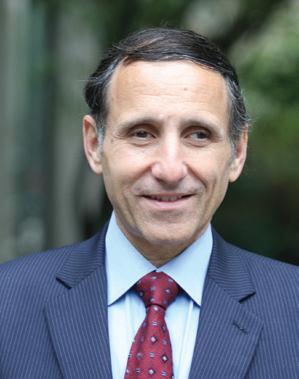
Special surcharges and taxes within the district for hotels, sales and meals would help maintain the development of the area, according to
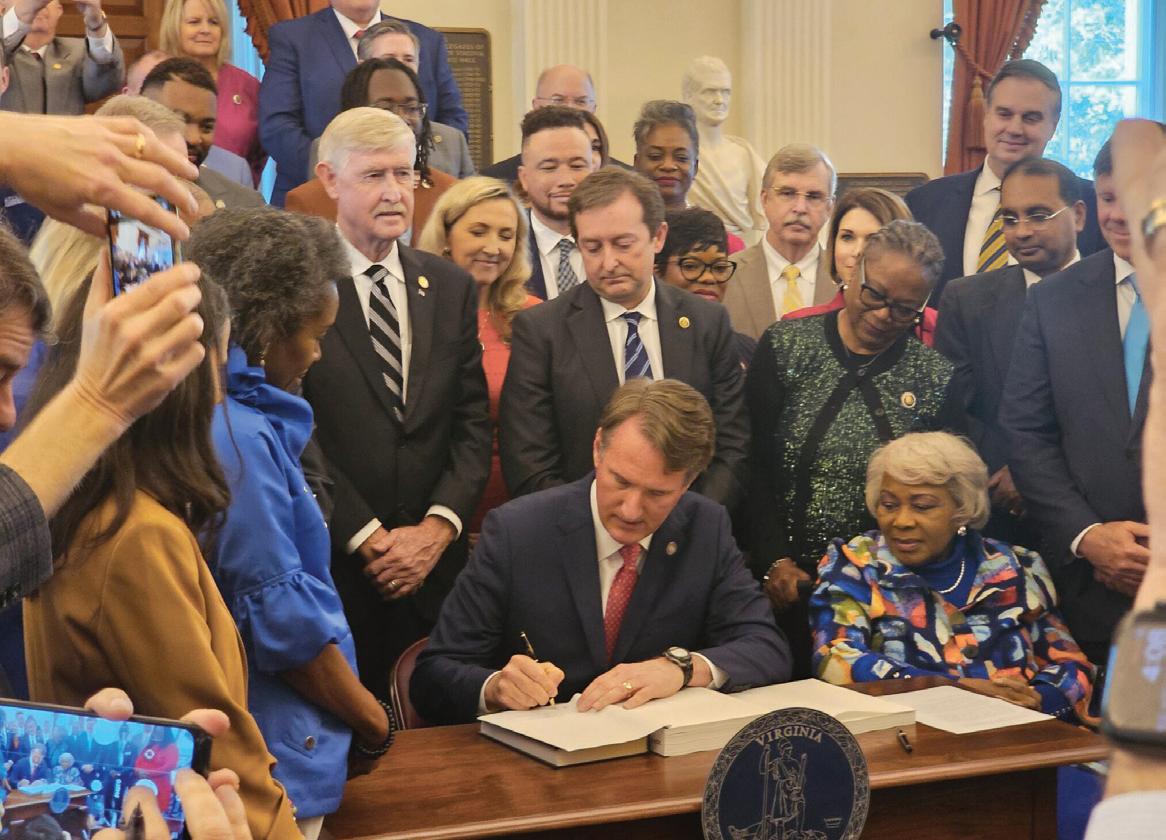
Sharon Ebert, Richmond deputy chief administrative officer for economic and community development.
Mr. Goldman, however, has challenged the approval of the project in his lawsuit, which names Mayor Levar M. Stoney, seven city council members, Richmond City Clerk Candice Reid and Richmond Circuit Court Clerk Edward Jewett as defendants.
The suit claims the development and approval of the Diamond District project violates the state constitution, the Richmond City Charter and “several interrelated First Amendment rights.”
Mr. Goldman also asserts that the proposal was not properly conducted with residents’ thoughts and concerns in mind.
“In the long history of Richmond, indeed (...) in the history of the Commonwealth of Virginia, no Mayor nor City Council have ever rushed through such a general obligation bond deal for a sports arena in such a short amount of time,” Mr. Goldman wrote in the suit, “leaving the public no practical opportunity to play a meaningful role in the process.”
Mr. Goldman previously held a major role in community efforts against two failed propos-
After months of partisan combat over different priorities, Virginia lawmakers approved a bipartisan budget deal Monday with no major tax changes, funding boosts for education and mental health and salary increases for teachers and state employees. Both chambers of the General Assembly approved the new two-year budget plan by wide margins. In the House of Delegates, the vote was 94-6. The state Senate approved it 39-1.
“This has been a protracted process,” House of Delegates Appropriations Committee Chairman Luke Torian, DPrince William, said on the House floor prior to the vote. “But working together with the Senate and the governor we have developed a product that all parties believe will meet the needs of the Commonwealth.” A handful of votes against the budget were cast by Republicans, but Gov. Glenn Youngkin officially signed the document Monday afternoon, resolving the budget standoff and officially ending the remote possibility of a state govern-
ment shutdown on July 1.
“We in fact listened to one another,” Gov. Youngkin said. “And understood each other’s priorities and perspectives. And that came together in the budget that we are going to sign today.”
No tax increases, no tax cuts
The new budget agreement reflects the narrowly divided political dynamic in Richmond after Gov. Youngkin failed to win GOP majorities in last year’s legislative elections. The legislation doesn’t include any of
Council members host honorary street naming ceremonies
Richmond City Council members plan to honor two esteemed citizens this week with honorary street namings. Councilwoman Ellen Robertson of the 6th District will hold an honorary street naming unveiling ceremony for the Rev. Shady Clark Jr. on Saturday, May 18 from 10 to 11 a.m. at the corner of 1601 Littlepage St. and Mechanicsville Turnpike. A reception will follow.
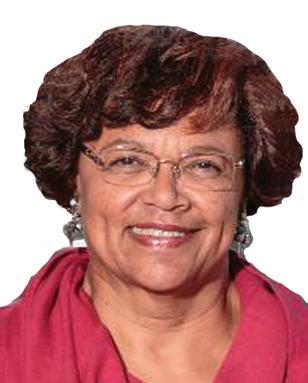
Rev. Clark has been a pastor at Eastminister Presbyterian Church in the East End for almost 50 years. He also served in the education field as a high school counselor and principal, school district administrator, community college adjunct professor and a supervisor with the Virginia Department of Education’s Office of Program Administration and Accountability. Richmond City Council established the honorary street naming designation on March 25. The corner of 1601 Littlepage St. and Mechanicsville Turnpike will be named Rev. Shady Clark, Jr. Way. In the 3rd District, Councilwoman AnnFrances Lambert will also host an honorary street designation ceremony for Melvin L. Davis Sr. on Wednesday, May 22, from noon to 1 p.m. in the 400 block of East Ladies Mile Road.
Mr. Davis started as a painter who later constructed 40 homes in Richmond. He co-founded the Davis & Myers Construction Company in 1947, one of the largest minority-owned general contractors in the Mid-Atlantic region. Mr. Davis died in 2006. Richmond City Council established the honorary street naming designation on Dec. 11, 2023. The 400 block of East Ladies Mile Road will be named Melvin L. Davis Way. For more information about Melvin L. Davis Way, contact Sam Patterson at (804) 241-7544 or samuel.patterson@rva. gov. For more information about the 6th District event, contact Ms. Robertson at (804) 646-7964, (804) 314-7658 or ellen. robertson@rva.gov.
Free community testing for COVID-19 continues
For the week of Saturday, May 11, confirmed hospital admissions for COVID-19 in Virginia dropped 90.4% from the previous week. Three deaths associated with COVID-19 were reported statewide for the week ending Saturday, May 11. COVID-19 wastewater levels in Central Virginia were below detection as of the week of Sunday, May 5.
Free community testing for COVID-19 continues.
The Richmond and Henrico County health districts are offering testing at the following locations:
• Thursday, May 16, 1 to 5 p.m. - Henrico Arms Apartments, 1566 Edgelawn Circle.
• Friday, May 17, 11 a.m. to 1 p.m. - Southside Plaza WIC, 509 E. Southside Plaza.
• Wednesday, May 22, 8 to 10 a.m. - East Henrico Recreation Center, 1440 N. Laburnum Ave.; 2 to 4:30 p.m - St. Luke’s Apartments, 117 Engleside Drive.
RHHD’s Resource Centers are providing free at-home tests for pickup at select locations:
• Creighton Court at 2150 Creighton Road, call 804-371-0433.
• Fairfield Court at 2311 N. 25th St., call 804-786-4099.
• Gilpin Court at 436 Calhoun St., call 804-786-1960.
• Hillside Court at 1615 Glenfield Ave., call 804-230-7740.
• Mosby Court at 1536 Coalter St., call 804-786-0204.
• Southwood Court at 1754 Clarkson Road. Unit #B, call 804-230-2077.
• Whitcomb Court at 2106 Deforrest St., call 804-786-0555. Call the Richmond and Henrico Call Center at (804) 205-3501 from 8 a.m. to 5 p.m. Monday through Friday. For information on testing sites, or go online at vax.rchd.com.
The Virginia Department of Health also has a list of COVID-19 testing locations around the state at www.vdh.virginia.gov.
Want a COVID-19 vaccine?
Those interested can schedule an appointment with RHHD by calling (804) 205-3501. Vaccines.gov also lists nearby pharmacies and clinics that offer the COVID-19 vaccine, and those interested can also text their ZIP code to 438829 or call 1-800-232-0233.
The Centers for Disease Control and Prevention currently recommends that children between the ages of 6 months to 4 years old may need multiple doses of the updated vaccines depending on their COVID-19 vaccine status and whether they had previously received Pfizer and Moderna.
Waiting periods for additional vaccines can range from three to eight weeks or four to eight weeks depending on the vaccine dose previously received.
Children between the ages of 5 to 11 years old who are unvaccinated or have received a vaccine before Sept. 12, 2023, should get one updated Pfizer or Moderna vaccine.
Those age 12 and older who are unvaccinated should get either one updated Pfizer or Moderna vaccine or two doses of the updated Novavax vaccine. People in that age range who received a vaccine before Sept. 12, 2023, should get one updated Pfizer, Moderna or Novavax vaccine. People who are moderately or severely immunocompromised may get additional doses of updated COVID-19 vaccine, and are encouraged to talk with their healthcare providers about receiving them.
Information compiled by George Copeland Jr.
Corrections
The name of South African artist Xolani Sivunda was misspelled in last week’s Cityscape. Also, on the Sports page, the name of Banner Christian School Athletic Director Zach Coyle was misspelled and the school’s nickname, the Bearcats, was incorrect. The Free Press regrets the errors.
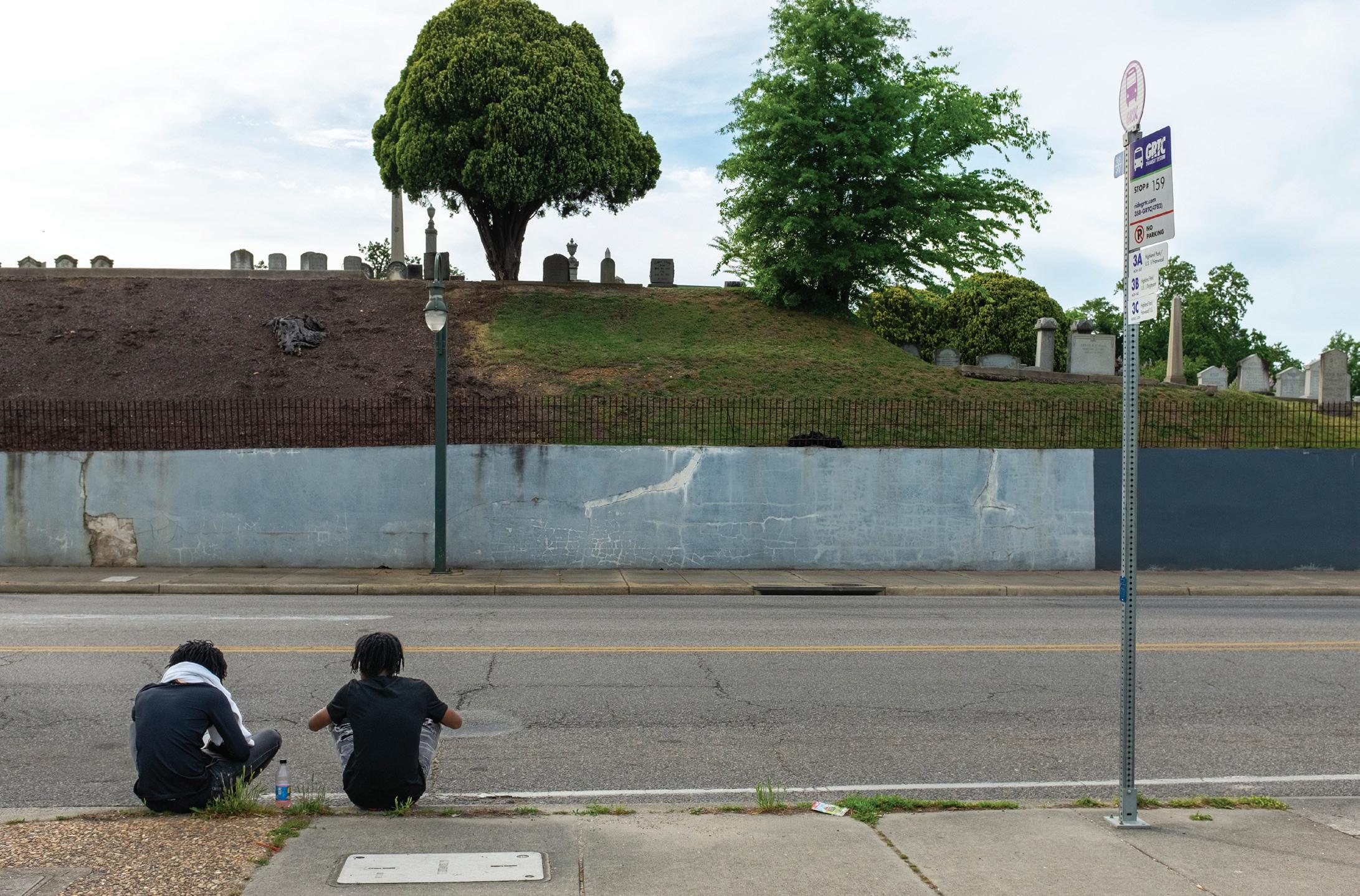
On Monday, Richmond City Council approved a series of collective bargaining agreements with several key unions. This move establishes Richmond as the southernmost locality in Virginia to adopt collective bargaining for its employees. The agreements were made with the International Association of Firefighters (IAFF) 995, the Richmond Coalition of Police (RCOP), and the Service Employees International Union (SEIU).
The city has formally established five bargaining units: Police, represented by RCOP; Fire and Emergency Services, represented by IAFF 995; Administration and Technical, represented by SEIU; Professional, represented by SEIU; and Labor and Trades, represented by The Teamsters. While agreements for the Police, Fire and Emergency Services, and Administration and Technical units have been finalized,
The Richmond Folk Festival returns to Brown’s Island September 27-29, celebrating its 20th anniversary. The initial lineup of artists for the 2024 Richmond Folk Festival includes go-go band Trouble Funk, jazz artist Lonnie Holley, bluegrass group Junior Sisk Band, among many others.
This year, the festival is scheduled earlier than usual to avoid coinciding with Yom Kippur. Additionally, there are changes to the festival site, with two of the six stages relocated due to ongoing developments. An updated festival site map will be available on the festival’s website and in guides distributed at the event.
“The festival site on Downtown’s riverfront is an ever-changing one, as we see its growth and progress lead to a number of modifications,” said Stephen Lecky, director of events at Venture Richmond. “You’ll still find all your favorite things to see and do, but this year, you may need to look at the festival map to chart your course. We’ll provide you with everything you need to find what you’re looking for!”
Over the past two decades, the festival has grown into one of Virginia’s largest events, attracting fans to Downtown Richmond’s riverfront to celebrate American culture through music, dance, traditional crafts, storytelling and food.
negotiations for the Professional and Labor and Trades units will commence in the coming weeks.
This development underscores Richmond’s commitment to fostering positive labor relations and recognizing the contributions of its employees, according to a statement from the Office of Council Chief of Staff.
Councilmember Reva M. Trammell, who was an advocate for the collective bargaining ordinances, emphasized the significance of these agreements. She noted the approval acknowledges the vital role all city staff play in maintaining Richmond. Council President Kristen M. Nye, who co-led the collective bargaining efforts, expressed pride in Richmond’s progress, highlighting the city’s role as a leader in public sector collective bargaining in the Commonwealth.
Mayor Levar M. Stoney also celebrated the council’s decision. He remarked on his early advocacy for municipalities in Virginia to have the authority to pursue collective bargaining, expressing pride in the progress made since 2020.
Over the next three years, the City of Richmond has committed $29 million for Fire, Emergency Services, and Emergency Communications, $34 million for Police, and $20 million for Administrative and Technical Employees. In the Fiscal Year 2025 budget, $9.1 million has been allocated to raise pay for police officers, firefighters, and emergency services employees, $3 million for administrative and technical employees, and $3 million to provide a 4% salary increase to all City employees. An additional $2 million has been designated for targeted pay increases for positions identified as below market rate.
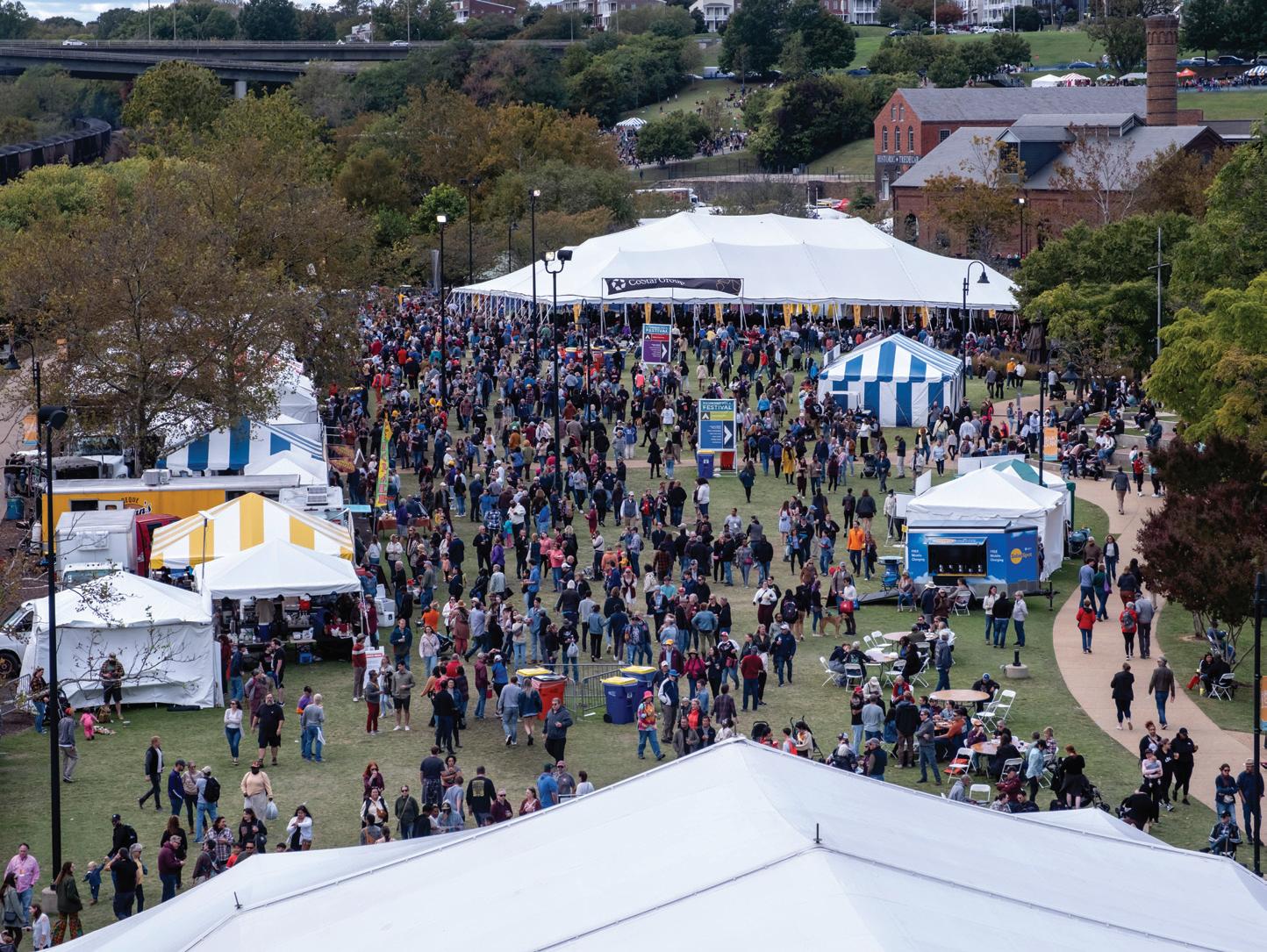
The Richmond Folk Festival is a free event that welcomes approximately 200,000 people over a three-day weekend. It features six stages and over 30 performing groups from across the nation and around the world, showcasing a diverse array of cultures and traditions. To mark the 20th anniversary, the festival will bring back several favorite performers from previous years.
Other artists announced this week include: Canzoniere Grecanico Salentino, performing Southern Italian pizzica tarantata from Salento, Italy; John Doyle & the Irish American Music Masters, featuring Irish music from Chicago, Brooklyn, Bristol, Vermont, Asheville, North Carolina, and County Louth, Ireland; Mis Blandine, showcasing Congolese soukous from Toronto, Ontario; Peni Candra Rini, performing Javanese sindhen from Tulungagung, East Java, Indonesia; and Rancho Aparte, featuring Colombian chirimía music from Quibdó, Colombia. The Richmond Folk Festival is presented by Venture Richmond Events in partnership with the National Council for the Traditional Arts, Virginia Humanities, Center for Cultural Vibrancy, the Children’s Museum of Richmond, and the City of Richmond.
After the search for a new leader of the Office of Equity, Diversity and Opportunity, Henrico County Public Schools has appointed Tiffany Lewis, an education specialist from within the same office.
Ms. Lewis, a Varina High School graduate, began her work in the school division as an English teacher at Varina High from 2007 to 2010. She later joined the Office of Equity, Diversity and Opportunity in 2020 and has led initiatives to support belonging, inclusion and achievement for all students.
“Ensuring every student — regardless of their background — has access to the resources and support they need to be successful is at the heart of all teaching and learning in Henrico Schools,” said Amy Cashwell, Henrico Schools
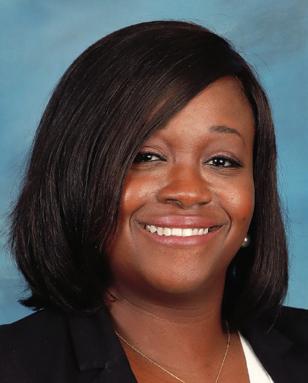
superintendent. “Through her work in the classroom and the Office of Equity, Diversity and Opportunity, Tiffany Lewis has demonstrated a deep understanding of student and family needs and the many ways HCPS and community organizations can partner together to break down barriers to achievement, address inequities and celebrate our diverse community of learners.”
Ms. Lewis earned a bachelor’s in communications with a minor in English from Old Dominion University. She also earned a master’s in organizational communication from
Marist College in New York and a master’s in education from the University of Virginia. She has several professional certifications and has served as an adjunct professor, academic consultant and curriculum writer.
“It is an honor to work with school and community partners to serve the students and families of Henrico County Public Schools in a way that recognizes and honors the dignity of all through a lens of equity and inclusivity,” Ms. Lewis said. “As a product of Henrico County Public Schools, I know the beauty that exists in the array of diverse lived experiences throughout the Henrico family. I am eager to continue helping our students attain high-quality academic outcomes for real-world, life-ready application.”













Continued from A1
Other sites included the Grand Contraband Camp in Hampton, Mt. Carmel Baptist Church in Albemarle County, the Massies Mill Odd Fellows Hall in Nelson County, Lower Surry Church in Surry County and the Suffolk African American Waterman Villages in the City of Suffolk.
The Jackson Blacksmith Shop in Goochland County, the Waterford Historic District in Loudoun County, the Blick Plantation in Brunswick County and the Washington Park Caretaker’s Cottage in the City of Roanoke also were named as part of the list.
The designation is the latest development for the Richmond Community Hospital since Virginia Union University announced its plan to build housing in the Northern area of its campus earlier this year. The potential removal of the building as part of that project inspired a public backlash, as well as offers to assess and figure out ways it can be a valued part of the city.
While gatherings in support of the hospital’s repair and reuse have been stymied recently by weather, those leading this com-
munity effort were honored to have their concerns about and goals for the building recognized.
“It elevates the exposure to Virginia about the importance of saving Richmond Community Hospital,” Ms. Baskerville said. “We’re hoping that we can then elevate that attention to the national level.”
“We look toward, hopefully, that this puts Virginia Union on notice that it is endangered and that inviting Historic Richmond in to do assessment now is a good thing to do.”
When asked for a response to the designation of the hospitals, a school representative acknowledged the group’s work while making clear that their housing project was still a major priority.
“Preservation Virginia does important work in the region, and the university is taking their point of view into consideration as we prepare to build new apartments in the North Side,” a VUU spokesperson stated. “Richmond has a pressing need for more housing options, and Virginia Union is working to be part of the solution.”
The next steps for Preservation Virginia, according to Ms.
Kostelny, will involve working to raise awareness of “the need to restore the purpose and revitalize these places.”
These efforts will include collaboration with the groups that nominated sites, influencing and contributing to public policy and other initiatives that will shine a light on the state of these places and the need to improve and maintain them.
Of the 180 sites listed as endangered and supported over the years by Preservation Virginia, only 10 percent have been lost so far, according to the group.
“Our goal is to strengthen the community’s ability to articulate how historic preservation and historic places enrich the local economy and the lives of all residents,” Ms. Kostelny said.
For Ms. Baskerville and those already working to preserve the hospital, plans are underway for an event in July celebrating the 90th anniversary of the hospital opening. Another rally outside the building is expected to be held in early June.
“We’re brainstorming and looking at ways that we can sustain the movement,” Ms. Baskerville said. “It is in its infant state, but we hope it grows strong.”
Continued from A1
als for a casino supported by Mayor Stoney and City Council members. A judge is set to hear the case on Thursday, according to Mr. Goldman and officials at the Richmond City Circuit Court.
Mr. Goldman was not the only person to raise concerns over the stadium financing. Hours
before City Council approved the issuance, the Richmond Crusade for Voters’ Board of Directors shared their worries over the potential financial burden residents would have to shoulder in a press release.
They also joined with the independent political group Richmond For All in calling for a referendum on the proposal.
“We believe that residents should have a
Continued from A1
direct voice in matters of such magnitude,”
Crusade President Marty Jewell said in a statement. “A referendum ensures that the people’s will guides decisions that profoundly impact our city’s financial landscape.”
If the Diamond District project is allowed to continue, development is expected to start in June.
On Monday, City Council also unanimously
Sen. Lucas said.
voted to approve Mayor Stoney’s $2.5 billion budget proposal with several amendments added after multiple meetings and public comment. An additional $17.6 million was reallocated to the Richmond Public Schools budget for a total of $239.3 million, pulling funding from other parts of the proposal, including $2.5 million from the now-postponed demolition of the Richmond Coliseum.
Continued from A1
Not Welcome at VCU” and “No Graduation As Usual,” chanting as they crossed the city.
“I’ve been told we should not politicize our major events in our university,” said graduate Arrington Evans, addressing the crowd and the press on the grounds of the park. “I’ve been told that it would ruin our moment, and if anything I think it made our moment better.”
A similar walkout by graduates occurred during Gov. Youngkin’s keynote speech at last year’s commencement ceremony at George Mason University. While Gov. Youngkin didn’t directly address the disruption of the VCU ceremony, his speech did seem to vaguely refer to the actions and decisions of some of the graduates.
“I encourage you to see opportunities for addition and multiplication, not subtraction and division. Seek out both/and moments, instead of either/or moments,” Gov. Youngkin said. “We need each of you, your talents, dreams, aspirations, your contributions that certainly will make tomorrow better than today.”
The walkout and subsequent march was the culmination of weeks of criticism by students over the choice of Gov. Youngkin as keynote speaker. His perspective on student protests against the Israel-Hamas war has earned him pushback that grew after VCU, local and state police used tear gas to disperse a proPalestenian encampment at the university weeks earlier.
However, Gov. Youngkin’s positions on race, gender, sexuality and education were frequent points of criticism weeks before that encampment. His administration’s approach to how VCU develops its curriculum ultimately inspired the walkout and protest, which was encouraged by the Not Welcome at VCU student group and the VCU chapter of the Virginia NAACP.
“Your administrative decision to continuously postpone the racial literacy requirement as well as comply with Gov. Youngkin’s demand to view the syllabi is anti-democratic and anti-intellectual,” the VCU NAACP wrote in a letter to the VCU Board of Visitors and VCU President Michael Rao.
“These actions not only undermine academic freedom and intellectual inquiry, they also perpetuate a narrative that overlooks the intricate nuances of racial history.”
While other commencement ceremonies went smoother in comparison to VCU, ongoing issues were made known at another. During Virginia Union University’s commencement ceremony last Saturday, Student Government Association President Syiyanna Finch took the time to acknowledge the challenges students and faculty had to face while on campus during her student address.
She cited heating and cooling issues in buildings, elevators that don’t work or leave people stuck, internet connection issues that drew laughter and applause from the guests and graduates.
The event was the first complete VUU graduation since the COVID-19 pandemic, with 343 graduates accounting for the largest graduating class in VUU’s history, alongside the largest class of graduate students VUU has seen, according to school officials.
VUU President Hakim J. Lucas downplayed any controversy around Ms. Finch’s speech as students being allowed “to tell their story,” but her words clearly struck a chord for those present, even when presented as a humorous take on the collegiate experience.
“But besides all that, we made it and we stuck it through,” Ms. Finch said. “And because of everything we went through at Virginia Union University, we can go through anything in this world.”
the tax cuts Gov. Youngkin called for in his original budget proposal last year. It also temporarily drops the idea of expanding the state’s sales tax to digital purchases like streaming services, downloads and software licenses, a tax expansion Democrats had included in their budget plan to help raise more money for public schools.
The end result is a budget with no tax cuts and no tax increases, but Democrats have signaled they plan to keep studying the digital sales tax proposal as part of a broader look at the state’s code ahead of the 2025 legislative session.
Democrats characterized the agreement as a win and emphasized that it reflected virtually all of the spending priorities they laid out during the regular session that ended in March.
“This is essentially the same budget that the governor called ‘backwards’ and now he will be signing it into law,” House Speaker Don Scott, D-Portsmouth, said in a statement. “We have historic funding for education, healthcare, coastal resiliency, and gun violence prevention. We are being consistent with our values and putting our money where our mouth is.”
Education funding
Due to the elimination of the digital sales tax, the state will lose $169 million in education direct aid spending. However, the budget includes more than $370 million for the At-Risk Add-On, which supports economically disadvantaged students, and a more than $70 million increase in support for English learner students.
The two-year budget includes state money to pay for 3% salary increases in both years for teachers and other school staffers as well as state employees.
The compromises on how public education will be funded in the new two-year spending plan “raise concerns about longterm fiscal stability of our state budget to fund critical K-12 priorities in the future,” the education advocacy group Fund Our Schools Coalition said in a statement after Monday’s special session wrapped.
The plan also has significant new spending to improve the state’s behavioral health system, adding more resources to help Virginians suffering from mental health crises.
RGGI re-entry language nixed
In addition to backing off the digital sales tax proposal, the budget deal dropped a Democratic provision aiming to force the Youngkin administration to have Virginia rejoin the carbon market known as the Regional Greenhouse Gas Initiative.
Senate Finance and Appropriations Committee Chair Sen. L. Louise Lucas, D-Portsmouth, suggested those steps were necessary as part of the back-and-forth with a Republican governor.
“I know these actions are not popular … and many feel that we are essentially kicking the can down the road, but progress can take time and sometimes compromise,”
The market requires electricity producers to purchase allowances to emit carbon as a way to incentivize decreasing the release of planet-warming carbon dioxide into the atmosphere.The revenues are returned to the participating states, where in Virginia about $730 million had been directed toward flood resiliency and energy efficiency programs.
But Gov. Youngkin had called the monthly fee tacked onto customer’s monthly bills to recoup the allowance purchases — which amounted to about $2.39 in Dominion territory — a “hidden tax,” prompting him to withdraw Virginia from the market through an executive order and regulatory change, despite advocates saying a legislative change is needed. The matter is being challenged in Floyd County Circuit Court.
Delegate Rip Sullivan, D-Fairfax, said in a floor speech Gov. Youngkin insisted the RGGI language come out “under threat of veto.”
“If RGGI is a tax then so are the additional fees Virginians will soon see on our electric bills,” Delegate Sullivan added, referencing legislation carried by Delegate Israel O’Quinn, R-Washington, and Sen. Dave Marsden, D-Fairfax, that Gov. Youngkin signed, allowing utilities to recover early development costs for a small modular reactor.
As for his insistence on removing the RGGI reentry language, Gov. Youngkin said in a press conference Monday afternoon, “We had a robust discussion around all aspects of the budget. … If we know that everyone is not happy then we probably landed in a good spot.”
Some environmental groups, except for the Chesapeake Bay Foundation and the Virginia Energy Efficiency Council, who support the RGGI funding coming into Virginia, released a statement earlier in the day that said removing the language was a “capitulation by the General Assembly.”
The Bay Foundation and Environmental Defense Fund said in their own statements not including the RGGI language was a disappointment, but separate measures included in the newly approved budget — including funding for pollution reduction measures and a new Chief Resilience Officer — are to be lauded.
Veteran families’ tuition waiver changes
Even as legislators in both parties hailed the deal’s passage as an example of putting partisan differences aside, some lawmakers pointed to a new problem that arose during budget talks that happened largely in private and was apparently only spotted once the deal became public.
Several legislators in the House and Senate voiced concerns about a provision included in the budget they passed that will impact the Virginia Military Survivors and Dependents Education Program (VMSDEP), which provides college tuition waivers to the spouses or children of per-
manently disabled military veterans.
Language in the budget will now require family members of disabled veterans seeking to further their education at a college or university to first complete the Free Application for Federal Student Aid (FAFSA), a change from the previous standards that required applicants: be the spouse or child (age 16 to 29) of a living or deceased veteran of the United States Armed Forces, United States Armed Forces Reserves, or the Virginia National Guard Virginia residents; have a physical presence in Virginia; and attend a Virginia public college or university.
The program is administered through the Virginia Department of Veterans Services (VDVS) in collaboration with the State Council of Higher Education for Virginia (SCHEV).
Several senators said on the floor that the budget language adds an unnecessary roadblock for veterans’ families trying to obtain an education.
“This is an issue I’ve heard from numerous families who really feel blindsided by what has happened,” said Sen. Tara Durant, R-Fredericksburg. “We expect this type of legislation to go through the proper process, through committee, when those who are impacted by it can come before committee and speak on it. … Instead [we are] legislating this through the budget. Many of us today are surprised to see how this is going to impact those families.”
Sen. Bill DeSteph, R-Virginia Beach, characterized it as an unintentional error.
“There’s nobody here that wants to cause any harm to those who sacrificed their lives, and what we recognize as a benefit or helping hand for their children. … I know that in our hearts of hearts, we don’t want to cause any harm to this program. I’m asking for Gov. Youngkin to call [for] a study on” the program’s requirements, Sen. DeSteph said. Sen. Jeremy McPike, D-Prince William, the patron of the 2019 legislation that expanded the program, agreed that its requirements needed further study and said his original intent was for the fund to provide veterans’spouses and children “opportunities for undergraduate” education, not “medical school and other things” he said the program is currently being used to pay for.
Gov. Youngkin proposed an amendment that would have preserved military families’ access to the program without the new FAFSA requirement but lawmakers rejected that suggestion, and all of his amendments, when they reconvened in the April 17 veto session.
Partisan drama was kept to a minimum Monday, and General Assembly leaders appeared to be trying to complete the budget as quickly and efficiently as possible.
“I don’t want to keep y’all here any longer than I have to,” Delegate Scott quipped at one point while presiding over the House. “As much as I love you all.”
This article originally appeared on virginiamercury.com
In response to the recent financial decisions, Pastor Robert Shaw from First AME Church in Los Angeles has issued a statement in defense of the church’s choice to file for bankruptcy protection for three of its entities: Fame Assistance Corporation, Fame Housing Corporation, and FAME/Good Shepherd Center Housing Development as of May 1. The move comes in the wake of severe financial difficulties attributed to what has been described as mismanagement and unfair business practices by the church’s leadership following
the Rev. Cecil Murray’s tenure. Pastor Shaw disclosed that problematic transactions and the misallocation of assets by the previous administration had left the church in a precarious financial state, necessitating the filing to stave off further fiscal damage.
“The last thing I wanted these entities to do was file for bankruptcy protection, but the three involved FAME corporations had assets that were encumbered or otherwise transferred to other parties under questionable circumstances, creating an untenable financial situation for the church,” Pastor Shaw said in a statement released by the church. “The perceived mismanagement
and unfair business practices in the administration that came after Rev. Murray sparked a chain of events that led the three involved Fame entities to where they are now. That status forced us to move quickly to avoid additional damage.”
According to one board member, “This has been a nightmare of epic proportions, I’m really disappointed with our current situation but my faith in God is unshaken!
The situation also casts a shadow over the legacy of one of Los Angeles’ most storied churches, with members expressing disappointment and heartbreak over the alleged mismanagement by former leaders. The financial
turmoil follows unsuccessful efforts by Shaw’s predecessor, Pastor J. Edgar Boyd, to rectify the church’s finances and reclaim assets, underscoring the depth of the crisis inherited by the current leadership.
The bankruptcy filings threaten the continuity of critical community services ranging from transportation to housing assistance. Despite the challenges, Pastor Shaw reassures that efforts are underway to maintain service delivery without interruption.
“In the face of these setbacks, our determination is to move forward,” Pastor Shaw said. “Fueled by faith we embrace and include the community as our own to serve.”
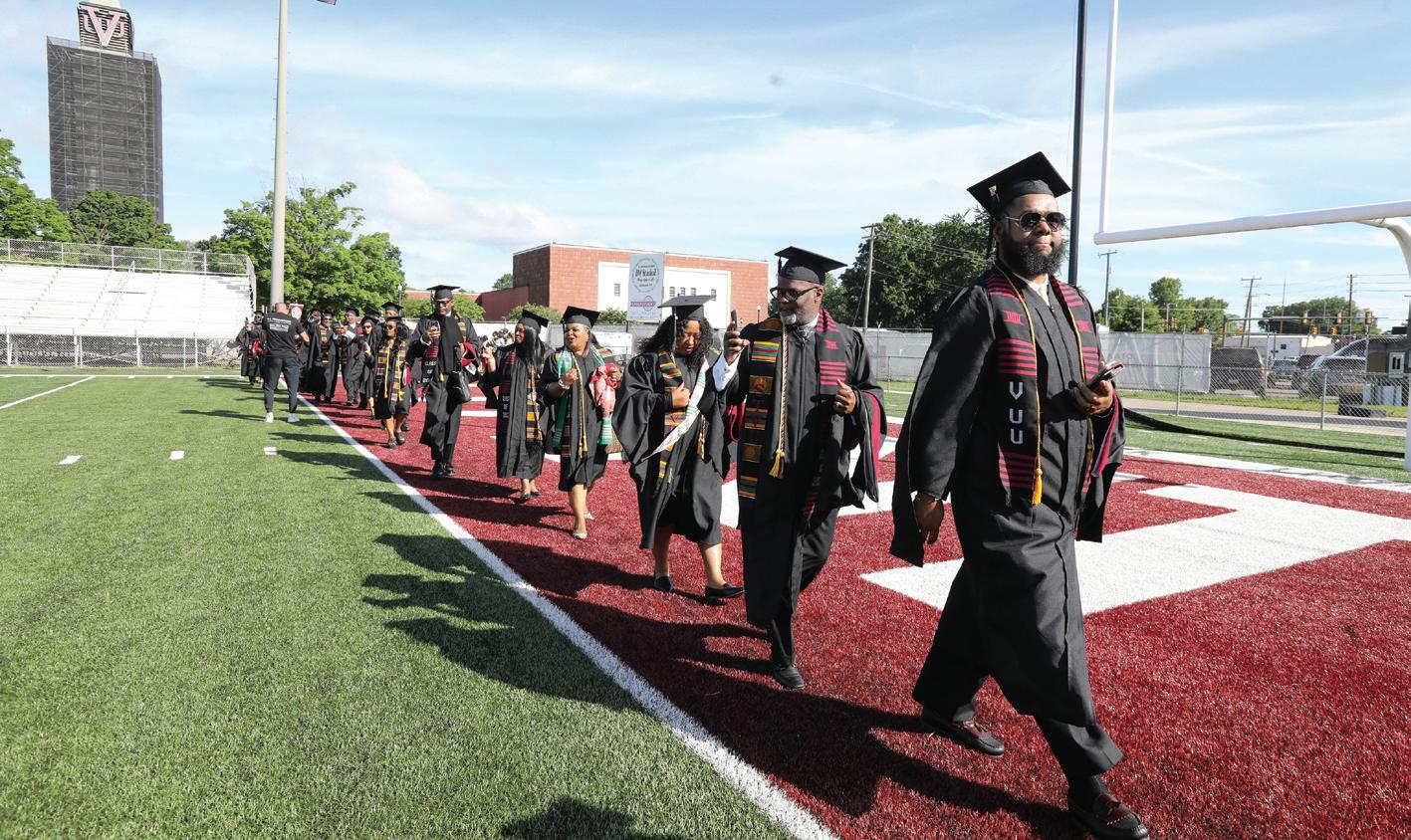
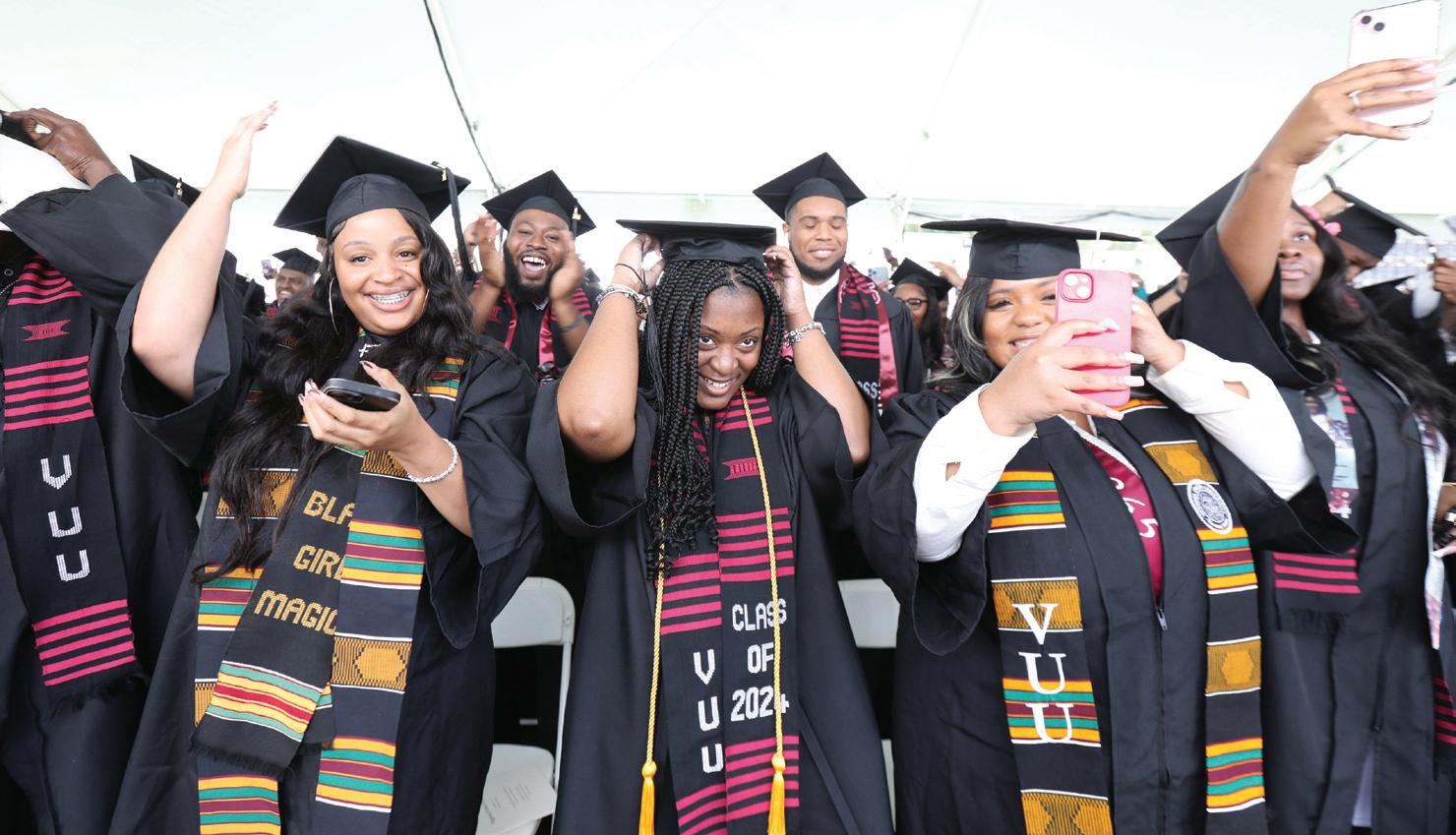


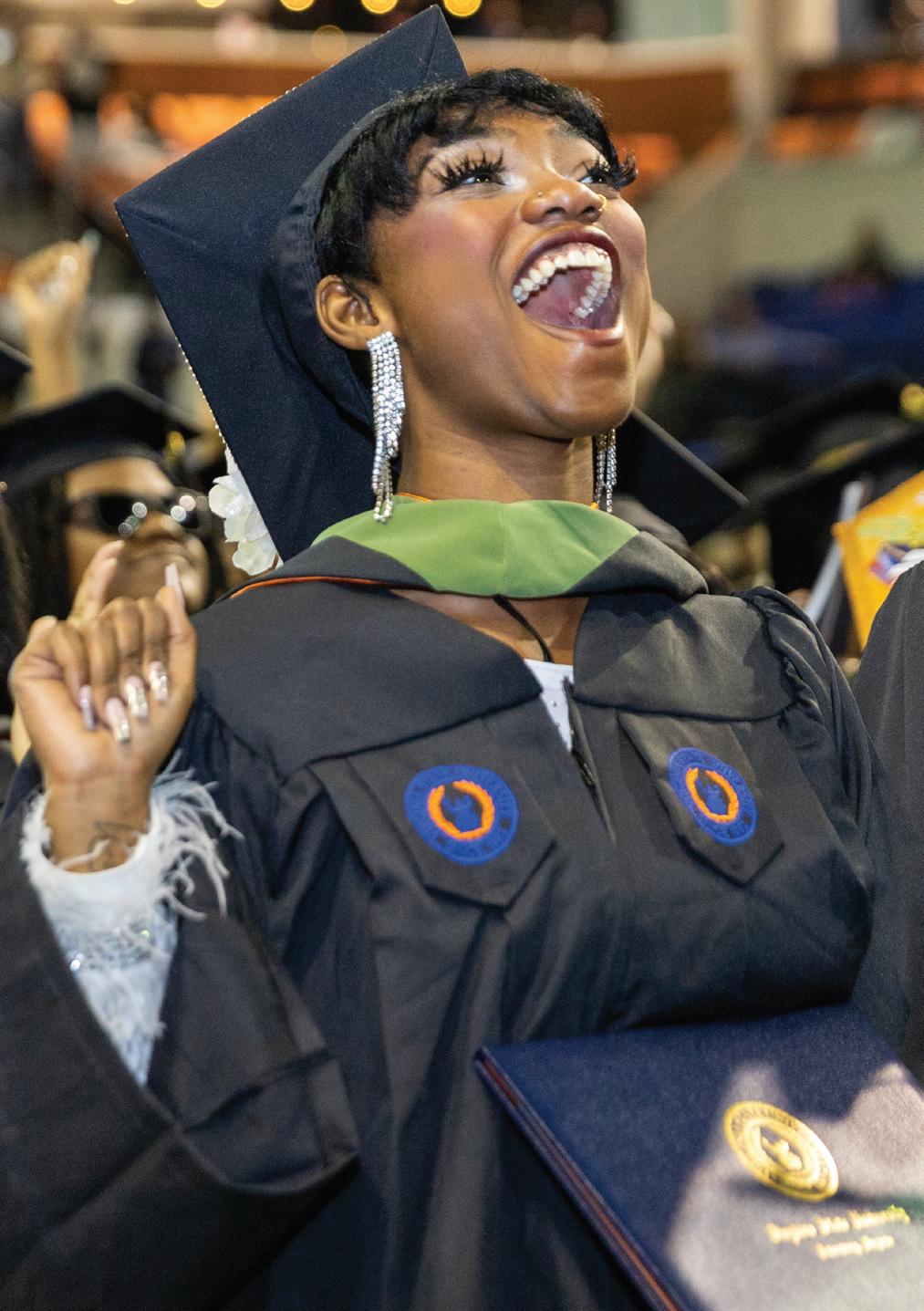
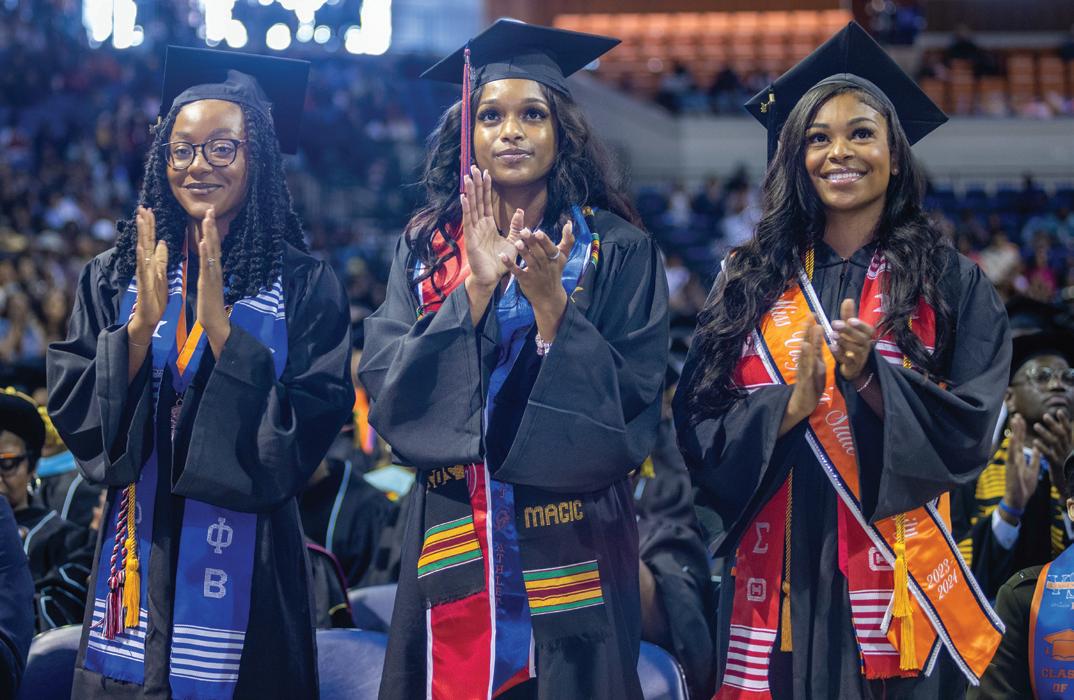


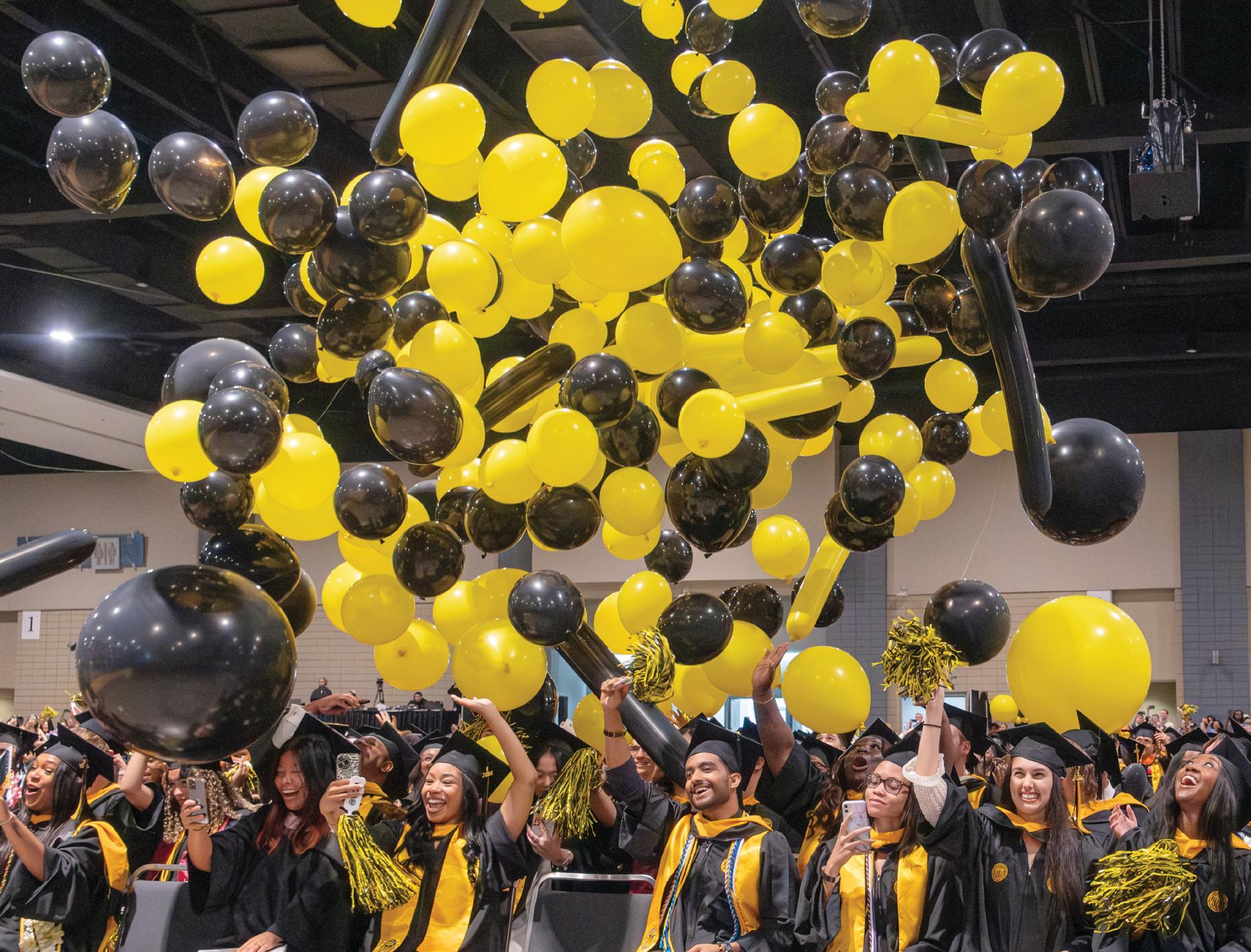
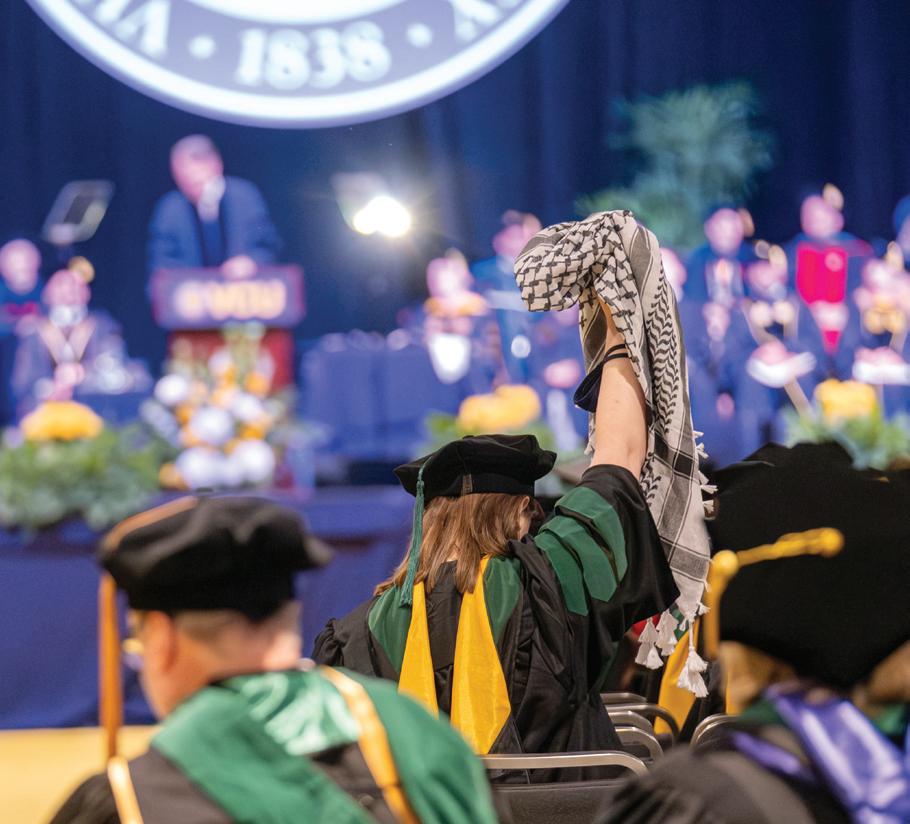
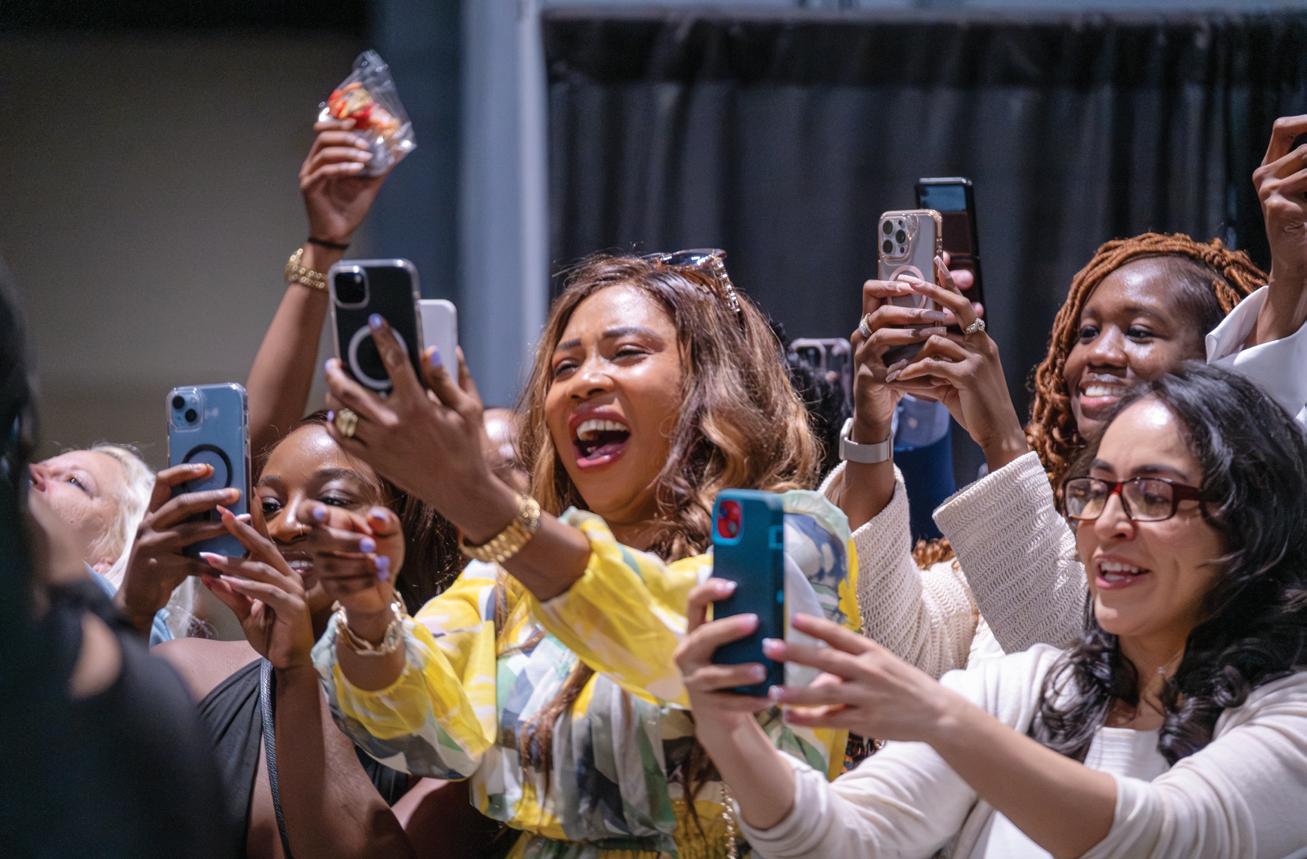
Courtesy of Virginia State University
At Virginia State University, the tradition of academic pursuit across generations is a tangible reality. The Spring 2024 Commencement witnessed a significant milestone as two families celebrated graduating together.
Having stood for 142 years, it is not uncommon for a son or daughter to attend classes on the same 231-acre campus as their mom or dad once did. However, it is rare for them to do it simultaneously. And yet, that was the case for Tanya McCoy and Arifah Goodwin, who graduated last week. It was a special moment for both, but perhaps more special when Mrs. McCoy shared the stage with her son and Ms. Goodwin with her daughter.
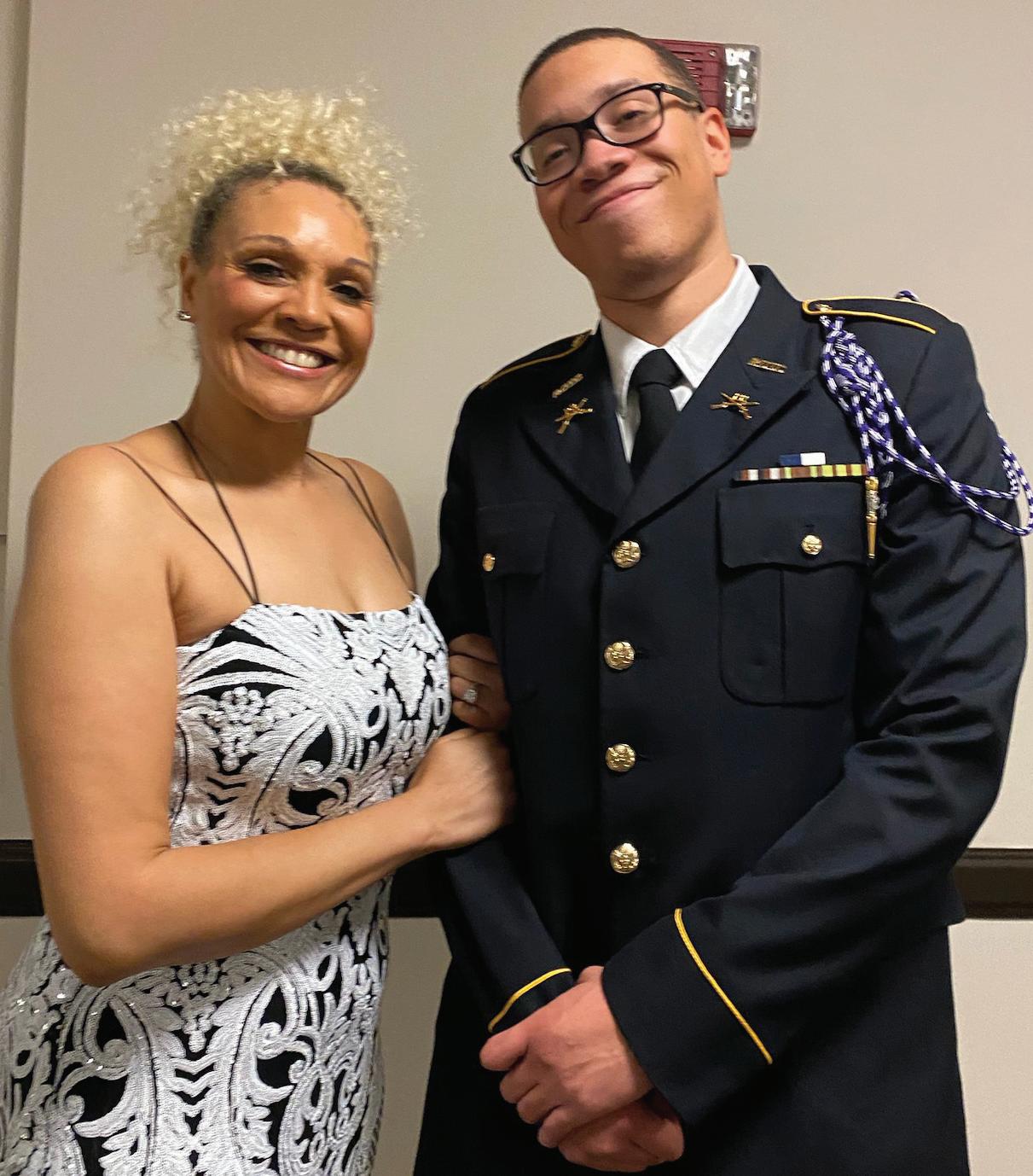
The road to a college degree isn’t always straightforward. There are twists, turns and bumps along the way, sometimes time away from the classroom. For the 54-year-old Mrs. McCoy, there was a musical career that spanned 25 years across Europe before returning to the U.S. to finish her schooling.
Mrs. McCoy was scheduled to graduate from VSU in 1995 but needed to complete her senior recital, a requirement for all music majors with a concentration in vocal performance before getting their degree.
Instead of knocking out the one-credit course, Mrs. McCoy ventured to Europe with her soon-to-be husband, another VSU music major, Kevin McCoy. She began performing abroad as a full-time singer, touring with The Black Gospel Pearls before going solo. During her career, Mrs. McCoy has performed in Germany, Spain, Romania, France, Austria and China.
While living out her dream, Mrs. McCoy pondered returning to VSU after her son, Kevin McCoy Jr., was born in 1999. However, it wasn’t until last semester that she actually enrolled.
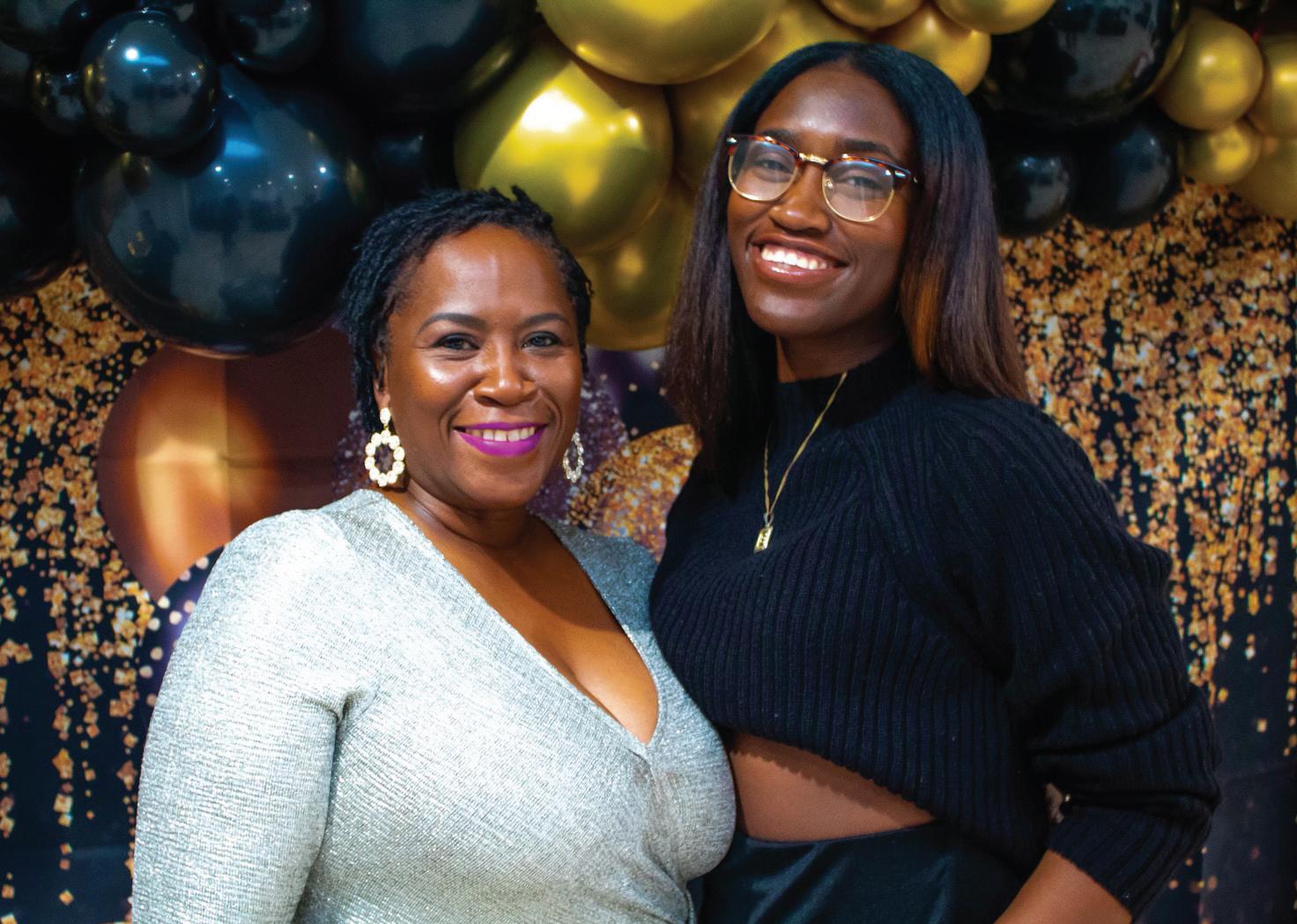
Tanya McCoy and her son, Kevin McCoy, left, graduated together at VSU recently. They were joined by fellow graduates, Arifah Goodwin and Erickah Rogers.
“I came back because I really wanted to finish, and I promised my mom I would because I was the first person from my family to go to college,” Mrs. McCoy said. “It was also extremely important to me to create a legacy at VSU, especially after my son, Kevin Jr., enrolled here.”
Kevin Jr., who received a bachelor’s in business management, had no issues appeasing his mother’s wish. He was even later joined by his sister, Taylor, a junior at VSU. Right away, Kevin Jr. settled in and joined the university’s ROTC program, where he eventually became the battalion commander. Kevin Jr. says he plans to be commissioned into the Army as an officer, but only after a one-of-a-kind graduation.
“Not many sons can say they graduated from college at the same time as their mom,” he said. “It’s hard to describe how it feels, but I can definitely say I made the best decision.”
It was the emotional end of a long journey that started and where it finished.
“I found family and I found love at Virginia State University,” Mrs. McCoy said. “My life is forever changed from being on this campus and I will never forget my time here.”
Meanwhile, Arifah Goodwin’s ties to VSU also are deeply

For the past five weeks, Martin Luther King Jr. Middle School students have collaborated on a nature-inspired mural in Jefferson Park as part of an after-school program. The completed mural will be presented 4 p.m. Tuesday, May 21, at the park. The free after-school program, In Tune, is a mural project led by Open Space teaching artists and professional muralists Auz Miles and Birdie Oleniacz. Open Space, founded in 2021, is a nonprofit dedicated to art education and nature-based learning.
Guided by Ms. Miles and Ms. Oleniacz, students learned the process of creating a mural
PH “Cruz” Sherman officially entered the race for the 8th District School Board seat, currently held by Dawn Page. Mr. Sherman filed his Declaration of Candidacy with the Richmond City Office of Election on Wednesday, May 8. Page announced that she would not seek reelection last week.
by photographing nature elements found in the park, collaborating on the design of the composition and painting the outward-facing 24-foot by 8-foot stage wall of the Jefferson Park Stage House. The project aims to connect students to nature in a way that helps them recognize their interconnection with their community.
“By learning more about the vegetation and wildlife in the park, as well as the varied histories of the park, students are collaboratively creating a mural that expresses the energy unique to this location,” according to a press release from Open Space.
To learn more, visit openspaceed.org.
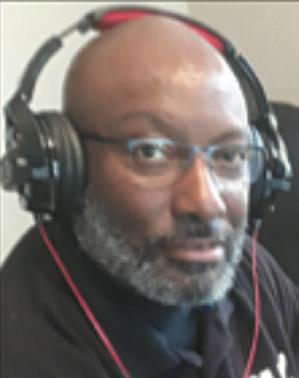
Mr. Sherman has been employed at Owens & Minor, Inc. for over 17 years and serves as a chaplain with the City of Richmond Police Department. He advocates for curbing gun violence and was a youth crisis counselor at
Blackwell Elementary School, and a special education instructor for Chesterfield Public Schools. Additionally, he is the CEO of Cruz Inc. Media and Cruz Inc. Radio 102.8. In a May 14 post to Facebook, Mr. Sherman announced he was 15 registered voter signatures away from the 150 signatures needed for his petition to be on the election ballot before June 18. His committee is planning a meet and greet for constituents to ask questions and sign the petition. The date and location are to be determined.
rooted. Growing up, she attended classes at the university where both her parents earned undergraduate and graduate degrees.
They say history has a way of repeating itself, and that is undoubtedly true for Ms. Goodwin, who, as a single mom, continued the family tradition by bringing her 14year-old daughter, Erickah Rogers, to class with her while she worked on her bachelor’s in sociology.
There’s no denying Ms. Rogers’s first experiences at VSU left a strong impression on her. Still, she was reluctant to return after graduating high school.
“Virginia State has always been present in my life, and I think that’s part of the reason why I didn’t want to come here initially. It felt like something I already knew,” she said.
Ms. Goodwin decided to attend a different four-year institution, but virtual learning was a struggle when the pandemic restrictions forced her to take her courses online. Because Erickah, her daughter, was back home and already close by, she decided to transfer to VSU.
“It was one of the best decisions I ever made,” she said. “I ran from it when I was 18 but quickly realized I could have my own experience here.”
Just like her mom did in 2017, Ms. Rogers will receive her degree in sociology. She says her mom is one of her biggest academic inspirations, both personally and academically. After graduation, she plans to pursue a master’s in education.
While her daughter plans to continue her academic journey, Ms. Goodwin’s is coming to an end. She received her third degree from VSU, a doctor of education in educational administration and supervision. Currently, she works at VSU as the assistant director for employee relations for the career services department. As far as what is next for Ms. Goodwin, she has authored two journals catered to black women and plans to pursue a marriage and family therapist license.
Biden and Trump agree to 2 presidential debates, leaving VSU date in doubtBy Josh Boak, Zeke Miller and Jill Colvin Associated Press
President Biden and former President Donald Trump on Wednesday agreed to hold two campaign debates — the first on June 27 hosted by CNN and the second on Sept. 10 hosted by ABC — setting the stage for their first presidential face-off to play out in just over a month.
The quick agreement on the timetable followed President Biden’s announcement that he would not participate in fall presidential debates sponsored by the nonpartisan commission that has organized them for more than three decades. This includes a debate scheduled for Virginia State University on Oct. 1.
“Virginia State University was excited to make history as the first HBCU to host a presidential debate,” Virginia Congresswoman Jennifer McCellan said in a statement. “I hope the ongoing negotiations between the two campaigns result in a presidential debate at VSU, and I have requested that the Biden-Harris campaign engage with Virginia State University students and the Tri-Cities community with an event before the election”
President Biden’s campaign proposed that media outlets directly organize the debates between the presumptive Democratic and Republican nominees
The debate is so unusually early on the political calendar that neither President Biden nor Mr. Trump will have formally accepted his party’s nomination.
Hours later, President Biden said he had accepted an invitation from CNN, adding, “Over to you, Donald.” Mr. Trump, who had insisted he would debate President Biden anytime and anyplace, said on Truth Social he’d be there, too, adding, “Let’s get ready to Rumble!!!” Soon after that, they agreed to the second debate on ABC.
“Trump says he’ll arrange his own transportation,” President Biden wrote on X, working in a jab about the perks of incum-
bency. “I’ll bring my plane, too. I plan on keeping it for another four years.”
Hunter Biden.
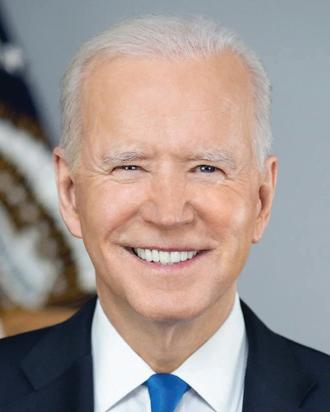
The swiftness with which the match-ups came together reflects how each of the two unpopular candidates thinks he can get the better of his opponent in a headto-head showdown. Mr. Trump and his team are convinced the debates will exacerbate voters’ concerns about President Biden’s age and competence, while the Biden team believes the Trump often-incendiary rhetoric will remind voters of why they voted him out of the White House four years ago. The presidential debates, always a critical moment on the political calendar, could be particularly important in a year when voters are underwhelmed with their choices and have expressed concerns about the candidates’ advanced ages — President Biden is 81 and Mr. Trump 77. Sprightly on social media, the rivals traded barbs — each claiming victory the last time they faced off in 2020.

CNN said that its debate would be held at 9 p.m. ET in its Atlanta studios with no audience present in a break from recent precedent. Moderators will be anchors Jake Tapper and Dana Bash, CNN said. ABC did not offer details on where its event would be held. Disagreements about moderators and rules were some of the questions that prompted the formation of the Commission on Presidential Debates in 1987.
The two campaigns and television networks had held weeks of informal talks on ways to circumvent the commission’s grip on presidential debates following years of complaints and perceived slights, according to two people familiar with the matter who spoke about internal discussions on condition of anonymity.
“Donald Trump lost two debates to me in 2020, since then he hasn’t shown up for a debate,” President Biden said in a post on X. “Now he’s acting like he wants to debate me again. Well, make my day, pal.”
Mr. Trump, for his part, said the president was the “WORST debater I have ever faced - He can’t put two sentences together!”
The June debate is likely to cap a busy and unsettled stretch, following the likely conclusion of Mr. Trump’s criminal hush money trial in New York, foreign trips by President Biden to France and Italy, the end of the Supreme Court’s term, and the expected start of two criminal trials for the president’s son,
The Biden campaign had proposed excluding third-party candidates, such as Robert F. Kennedy Jr , from the debates outright. Under the debate commission’s rules, Mr. Kennedy or other third-party candidates could qualify if they secured ballot access sufficient to claim 270 Electoral Votes and polled at 15% or higher in a selection of national surveys. Both CNN and ABC announced the same qualification threshold, saying candidates will need to reach at least 15% in four separate national polls of registered or likely voters that meet their standards.
In response, Mr. Kennedy accused President Biden and Mr. Trump of “trying to exclude me from their debate because they are afraid I would win.” He said, “Keeping viable candidates off the debate stage undermines democracy.”
The commission said in a Wednesday statement, “The American public deserves substantive debates from the leading candidates for president and vice president.” It said its mission is “to ensure that such debates reliably take place and reach the widest television, radio and streaming audience.”
‘What we decided was that we would pick that up at another day’By Graham Moomaw
After finishing work on almost everything else taken up during the 2024 session, the Virginia General Assembly and Gov. Glenn Youngkin have decided to keep talking about skill games
The governor and several lawmakers said Monday that they’ll continue seeking a way to get the slot machine look-alikes taxed and regulated in response to a major lobbying push by business owners and the companies that make and distribute the games.
“What we decided was that we would pick that up at another day,” Gov. Youngkin said Monday as he signed a bipartisan budget deal that didn’t address the legality of skill games. “That’s a commitment that we’ve made.”
There were few answers Monday on what the new skill game legislation might look like and when lawmakers could potentially return to Richmond to act on it.
“There’s more work to do,” said Sen. Aaron Rouse, D-Virginia Beach, a key sponsor of the skill game legalization bill. “We’ll make sure that we do put in that work so that by the time we come back we can be in a good place to have agreement on the bill.”
The decision to keep working on skill games even though the clock has run out on the regular 2024 session is the latest sign of pro-skill game lawmakers and industry lobbyists doing whatever it takes to allow the machines to start making money again for the businesses that host them.
Convenience store owners have traveled to the State Capitol in droves this year to convey that skill games have become a critical source of revenue that helped them get through the COVID19 pandemic and keep workers employed.
Del. Terry Kilgore, R-Scott, said he hopes the machines can still become legal on July 1, the date skill game supporters have been aiming for
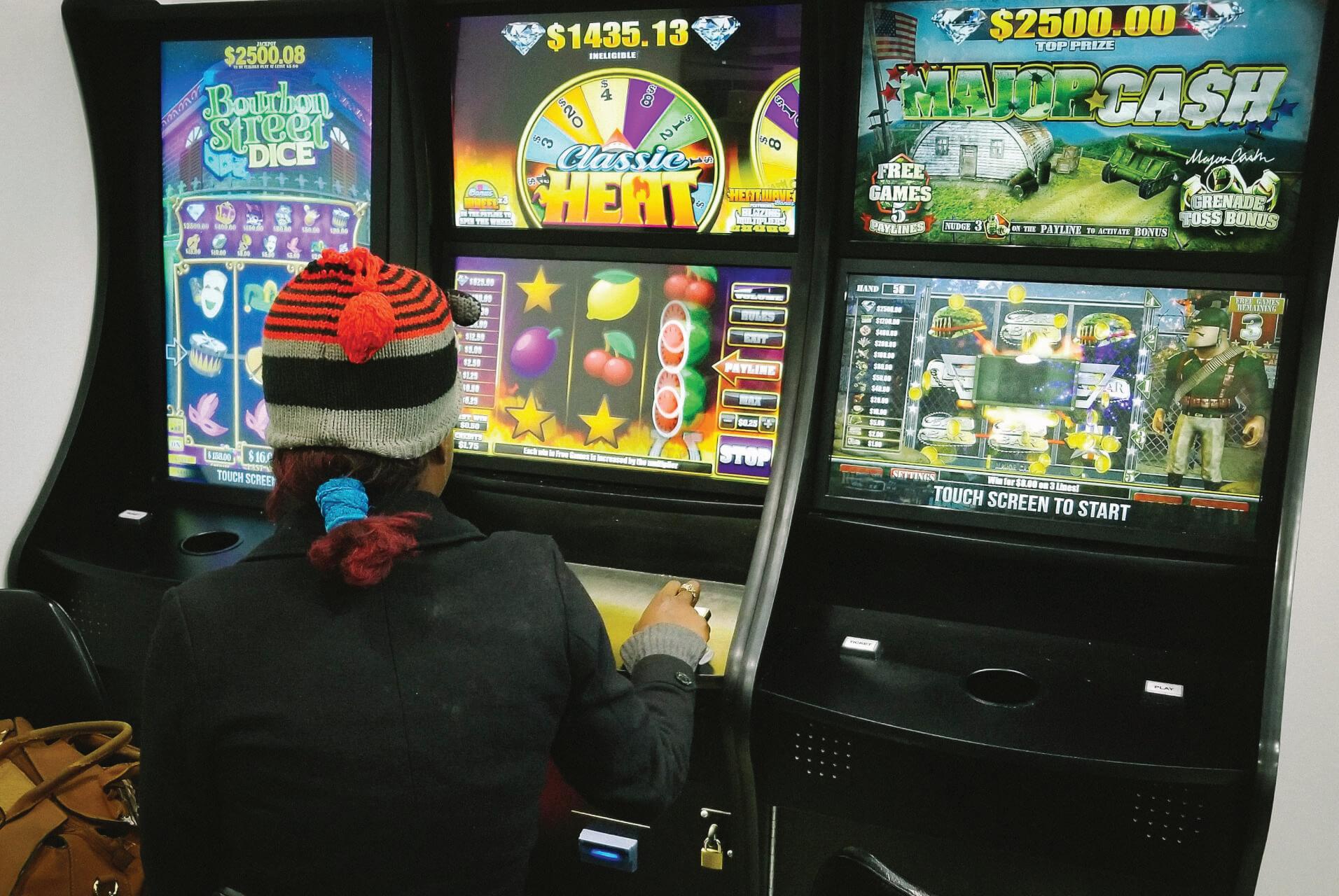
despite uncertainty over whether the state could have the manpower and technological systems in place to properly regulate them under that timeline.
The lobbying effort is being led largely by PaceO-Matic, a Georgia-based skill game company that’s become a major campaign donor to both parties in Virginia and has made contributions to both Gov. Youngkin and Democratic General Assembly leaders. The company also has hired Sen. Bill Stanley, R-Franklin, to perform legal work on its behalf and has hosted other senators at a rodeo event it sponsors every summer in Wyoming.
Lawmakers were back at the Capitol this week for a one-day special session to finish work on the budget. Because that special session didn’t completely adjourn Monday, lawmakers left open the possibility of returning later to take up skill games and any other legislation that might impact state tax revenues.
Summertime special sessions are rare, and they’re often called to address a crisis or emergency. It was unclear Monday how many rank
and file members of the General Assembly are on board with the prospect of coming back to the Capitol to resolve a dispute over how to legalize another form of gambling. Some weren’t too hot on the idea.
“I would rather us just be done with the issue,” said Del. Mark Earley Jr., R-Chesterfield, a skill game opponent who said he’s not convinced the public is clamoring for lawmakers to approve more gambling.
Virginians Against Neighborhood Slot Machines, an anti-skill game advocacy group funded by casinos that see the machines as undermining their more heavily regulated facilities, said it’s a waste of time and money to extend the special session to accommodate skill games.
“The amount of oxygen being wasted on convenience store slot legislation is truly embarrassing for our commonwealth,” the group said in a written statement.
Senate Majority Leader Scott Surovell, DFairfax, who voted for the skill game bill, said the talk of lawmakers returning to take up new legislation is more of a possibility than a sure
thing.
“If they come up with a proposal we’ll have to see what it is,” Sen. Surovell said. “To pass a bill like that in an efficient fashion in less than five days, it takes 80% votes. And I’m not sure whether or not people who don’t like skill games are willing to expedite the process.”
The skill game talks expected to occur over the next few weeks will mostly center on how to square Gov. Youngkin’s proposal, which skill game supporters see as far too strict, with a General Assembly bill critics say is overly friendly to the industry.
Gov. Youngkin proposed a higher tax rate on the machines than what the General Assembly envisioned, tougher regulations aimed at blocking minors and gambling addicts from accessing the machines and strict geographic limitations that would ban skill games in much of the state by barring them within 35 miles of any statelicensed casino or gambling facility affiliated with horse racing.
The geographic limits were particularly upsetting to skill game supporters because they would effectively ban the machines in nearly all of the state’s population centers due to the casinos and Rosie’s facilities, which feature slot machine look-alikes based on horse racing, that have already opened across the state.
Local control also has been a sticking point. Before casinos and horse racing facilities could open their doors, the state required them to first win approval from voters in the communities they were interested in. The skill game bill that passed the General Assembly didn’t require voter referendums and gave city and county governments no ability to ban the machines at the local level. Gov. Youngkin had suggested giving local governments the ability to opt out of skill games without requiring the type of opt-in referendums necessary for casinos and horse racing.
The state Senate rejected all of Gov. Youngkin’s suggestions and sent the original bill back to the governor’s desk, where it’s still awaiting action.
The governor is facing a Friday deadline to decide what to do, but he’s widely expected to veto the bill and start fresh with a new attempt to legalize the machines. This story originally appeared on virginiamercury.com.
Investigation reveals more than 1,000 deaths from police use of non-lethal tactics
By Stacy M. Brown NNPA Newswire Senior National CorrespondentMore than 1,000 people have died in the past decade after encounters with law enforcement, despite officers using non-lethal tactics, according to a recent investigation by The Associated Press, the Howard Center for Investigative Journalism, and PBS’ Frontline. The findings again show systemic issues within policing and raise questions about accountability and reform.
Each victim was unarmed and posed no immediate threat. Yet, they met tragic ends after police resorted to methods such as physical holds, Tasers, and body blows, which are typically meant to subdue individuals without causing harm. The investigation underscored the potential lethality of these tactics when misused, echoing the outcry sparked by the death of Mr. George Floyd in 2020.

In one of many examples, investigators highlighted an incident in South Boston, Va., where one of three officers who shocked a man rolling on a hospital sidewalk said a suspect’s actions—not Taser guidelines— dictate what to do. They noted that officers fired their Tasers a combined 20 times, even after handcuffing the man. “There are eight pages of warnings, and basically, if I read and abided by every single warning, I would not tase anyone,” the officer said in response to a civil lawsuit later settled out of court. Federal prosecutors said they didn’t see enough evidence to pursue civil rights charges against the three officers.
For the report, investigators filed thousands of requests for government documents and body-camera footage, unearthing over 700 autopsy reports or death certificates and uncovering video evidence in dozens of cases previously unreported.
The victims hail from diverse backgrounds, including Black Americans like Donald Ivy Jr., who were disproportionately affected, comprising a third of the fatalities despite representing only 12% of the population. A former three-sport athlete, Mr. Ivy, left an ATM alone one night when officers tried to detain him. Mr. Ivy ran, and police tackled and shocked him with a stun gun, belted him with batons, and held him facedown. Like so many others, investigators said Mr. Ivy was not a threat to public safety. “And despite that, each died after police used a kind of force that is not supposed to be deadly and can be much easier to hide than the blast of an officer’s gun,” they determined. Researchers also revealed a pattern of misconduct, with officers breaching established guidelines in approximately 45% of deaths. Many victims had underlying medical conditions or were under the influence of drugs or alcohol, factors that heightened their vulnerability to force.
Specific instances of misuse were highlighted, such as the widespread use of prone restraint, despite known risks of positional asphyxia. In numerous cases, individuals were pinned facedown for minutes beyond necessity, resulting in fatal outcomes. Similarly, researchers documented the excessive use of Tasers, with officers administering shocks beyond recommended limits, often with deadly consequences.
Researchers found that officers restrained someone face down in at least 740 of 1,036 deaths—usually with one, or sometimes more, using their body weight. In about half of the prone restraint cases, police didn’t turn the person over as soon as they were handcuffed or did so only after they had stopped responding. They noted a video showing a police officer in Ava, Mo., handcuffing a man experiencing a drug relapse and restraining him in a prone position for eight minutes. The officer warned that he wouldn’t ease up until the man stopped kicking. Once still, the officer asked the man, “Are you going to be calm now?” He didn’t answer. Another two minutes passed before the officer realized the man didn’t seem to be breathing. A federal judge who reviewed the video ruled in the officer’s favor in a civil lawsuit, saying the law didn’t require police to stop prone restraint once a person quit struggling. Researchers said legal
interpretation was out of step with federal courts in other regions, which provide broad direction on the use of force.
“Every day, police rely on common tactics that, unlike guns, are meant to stop people without killing them, such as physical holds, Tasers, and body blows,” researchers concluded. “But
when misused, these tactics can still end in death—as happened with George Floyd in 2020, sparking a national reckoning over policing. And while that encounter was caught on video, capturing Mr. Floyd’s last words of ‘I can’t breathe,’ many others throughout the United States have escaped notice.”

Editorial Page
May 16-18, 2024
College graduations have come to an end, and it’s not just the students who are breathing sighs of relief as the semester concludes. The most jubilant group, albeit without mortarboards to toss in the air (they might have to settle for toupees), are college presidents. This spring has seen tension and dissent simmering on many campuses, placing these well-paid administrators in challenging positions. Students have staged protests, camped out, spoken up, and even walked out, causing a stir nationwide. The demonstrations have led to arrests, injuries, property damage, and perhaps most frustrating for college presidents, negative publicity.
Pictures and videos from these events evoke a sense of déjà vu for those who remember protests on college campuses from a bygone era. While the issues may have evolved, the fervor and determination motivating students to risk their education and safety remain unchanged. The young people protesting are prepared to put everything on the line for what they believe in, posing a formidable challenge for those in power.
Adding to the woes of these pampered presidents is the historical precedent that often vindicates the actions of protesting students. Looking back at past student protests on issues such as the Vietnam War, racial injustice, and apartheid in South Africa, it’s evident that the angry student was often on the right side of history.
Summer has given the leaders of colleges and universities a reprieve. They’ll have time to think about their actions and better ways to engage their students who voice dissent.
Before School Board member Jonathan Young resigned a few weeks ago, the rest of the School Board recognized they had a problem. Mr. Young’s behavior, which an independent review described as “weird” and “odd,” didn’t technically violate school board policy, making it challenging to hold him accountable officially. According to a statement from Mr. Young, some board members found alternative methods to compel his resignation, proving that necessity indeed breeds creativity.
Subsequently, the School Board has initiated efforts to establish new guidelines regarding board members’ interactions with students. The proposed rules range from the glaringly obvious to the practically unenforceable, underscoring the adage, “You can’t legislate common sense.” While these rules aim to prevent situations similar to Mr. Young’s awkward engagement with students, it feels like setting a trap after catching the bear.
However, exceptions always exist, even to the rule about common sense and legislation. After failing to schedule mandatory training, the School Board learned that they were in violation of a state agreement, potentially risking a loss of millions in state funding. Thankfully, it seems the board members are now prepared to schedule the required training, sparing RPS students from bearing the brunt of any potential funding cuts. This decision is vital, as our students and teachers cannot afford to operate with fewer resources. In light of this development, perhaps an addition to the code of conduct is warranted, stipulating that School Board members must ensure adequate funding for the schools under their purview. Perhaps Captain Obvious could draft it for them.
Chesterfield County officials deserve kudos for announcing their plans for a sports hall of fame, dedicated to athletes with ties to the county. Some might argue that amidst the chaos of the world, sports serve merely as a distraction. They have a point. Yet, amidst the troubles and turmoil constantly bombarding our screens, a respite is essential.
In the narratives of athletes and teams striving together toward a common objective, people discover love, hope and inspiration. This notion extends to tackling the genuine issues of our time. As Arthur Ashe Jr. said, “Start where you are. Use what you have. Do what you can.”
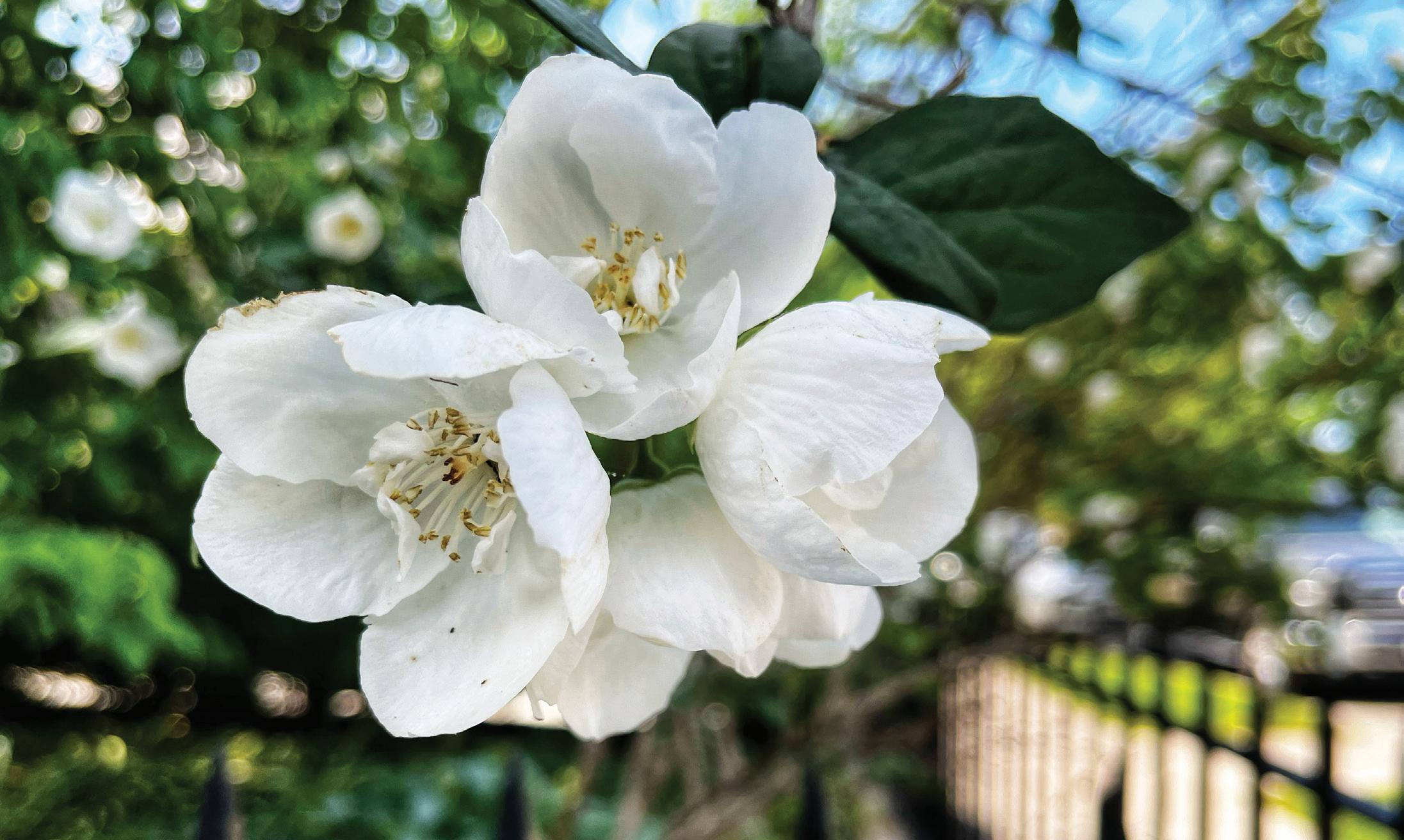
“Recent legal challenges have targeted programs aimed at alleviating the obstacles faced by marginalized communities, particularly those designed to promote equity in entrepreneurship … With this analysis, we can create and implement strategies that catalyze informed policymaking, advocacy efforts, and targeted interventions aimed at reversing systemic barriers and fostering a more equitable entrepreneurial ecosystem.”
Alliance for Entrepreneurial Equity, The State of Black Business 2024
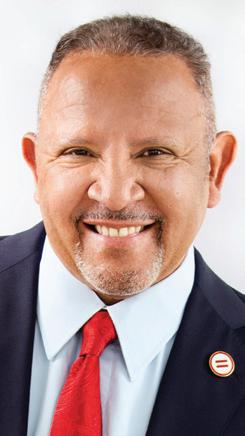
The good news: Blackowned businesses are more likely than other businesses to have a low level of debt, or no debt at all. The bad news: That’s because Black-owned businesses are far less likely to be approved for loans in the first place, and Black business owners are more likely to pull from their personal savings for business expenses.
The Alliance for Entrepreneurial Equity, a partnership of the National Urban League and Third Way, embarked on an “analytical journey” to understand the nuanced dynamics of racial inequality in the business landscape and underscore the urgency of advancing equal opportunities
for Black communities and other communities of color.
The result, the State of Black Business report, finds that Black Americans are drastically underrepresented among business owners relative to their share of the population. They are more likely than other businesses to be shut out of traditional financing opportunities. They are starved for venture capital investment. And they are less likely to be awarded government contracts.
Yet efforts to correct these disparities are under attack by extremist activists determined to preserve — if not widen — the racial gaps in the entrepreneurial
Marc H. Morialecosystem.
Earlier this year, a federal court shut down a pathway to opportunity for historically disadvantaged business owners and forced the Minority Business Development Agency to offer its services to non-marginalized communities.
The same right-wing activist who successfully challenged affirmative action in college admissions has sued to end a grant program for Black women entrepreneurs. Lawmakers in more than 30 states have introduced or passed more than 100 bills to shut down diversity, equity and inclusion initiatives.
Despite growing at a rate of 30% between 2018 and 2021, Black-owned businesses with at least two employees represent only 2.5% of all businesses in the United States. These businesses are smaller — only 3% have more than 20 employees, with the vast majority having fewer than five employees.
They’re also younger. Nearly half are less than two years old, compared to 19% of white-owned businesses.
Black-owned businesses face the greatest obstacles to financing, by far, more than any other demographic. Only 32% — compared with 56% of white-owned businesses — are fully approved for the financing they seek, while 40% — compared with 18% of white-owned businesses, are completely denied loans, lines of credit and cash advances.
Even when financing is approved, Black-owned businesses are more likely to be offered high interest rates. As a result, these businesses are more likely to delay plans to expand and have a harder time refinancing their existing debt.
The racial gap in venture capital investment is even more startling. Only 0.5% of venture capital funding went to Black founders in 2023.
As the fourth anniversary of George Floyd’s murder approaches, the demand for racial justice that arose in its wake is
Who would oppose legislation to outlaw antisemitism? More people than you might think.
First, there is the thorny question of definitions. Consider: How do you define “antisemitism”? As with some attempts to define racism, you may find yourself settling on a version of the late Supreme Court Justice Potter Stew art’s famous definition of obscenity: “I know it when I see it.” But, as with “rac ism” and oth er words that draw legal lim its on inhuman acts or beliefs, there is no moral off-ramp called, “It depends.”
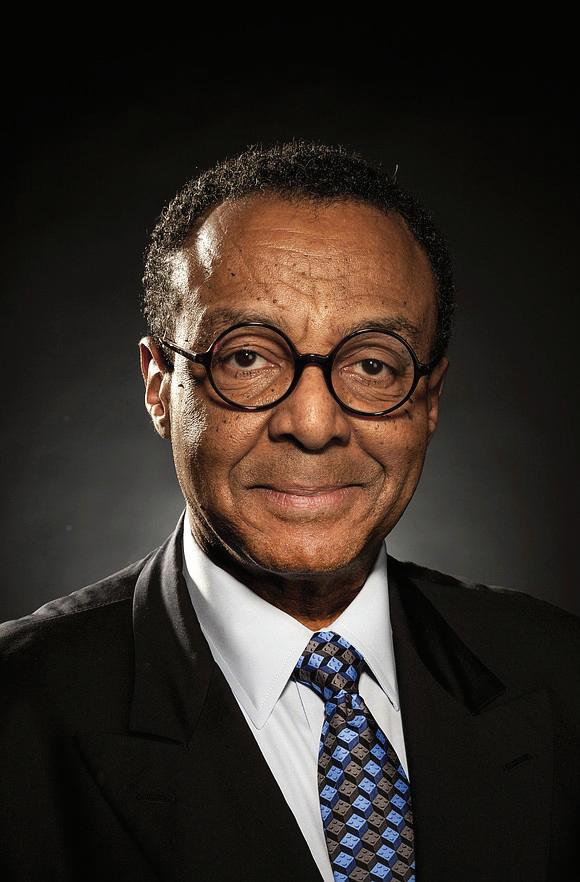
That’s why I found it ironic that the debate over a bill that passed last week in the Republican-controlled House to curb antisemitism began with heated discussion over definitions.
Eager to do something in response to a nationwide wave of pro-Palestinian protests at colleges, the Republican-controlled House passed a bill aimed at addressing reports of rising antisemitism on campuses.
House Speaker Mike Johnson, a Louisiana Republican, blamed “woke” policies by college leaders for failing to confront the spread and backed a bill to push back.
In contrast to the partisan gridlock that has plagued so much other major legislation,
this bill easily passed, although not without some important objections. The House passed the Antisemitism Awareness Act in a refreshing display of bipartisanship in these fractious times with a 320-91 vote, with a majority of Democrats — 133 — joining Republicans.
New York Republican Rep. Mike Lawler, who introduced the bill, was predictably delighted to thank the supporters of the bill “from a wide range of Jewish
organizations that are standing up, endorsing this legislation, and saying enough is enough.”
But is that enough? The American Civil Liberties Union was not impressed by the bill and opposed the legislation — which still must be approved by the Democratic-controlled Senate and signed by President Biden to become law — as infringing on rights of free speech.
Besides, as the ACLU pointed out in a statement, “Federal law already prohibits antisemitic discrimination and harassment by federally funded entities.”
Instead of protecting against antisemitic discrimination, the ACLU letter said, the proposed law “would likely chill free speech of students on college campuses by incorrectly equating criticism of the Israeli government with antisemitism.”
Thank you, ACLU, for adding to the body of material I call up every time somebody
suggests muzzling political speech — even obnoxious and toxic speech — that the First Amendment was written and enacted to protect.
That’s why Rep. Jerry Nadler, top Democrat on the House Judiciary Committee and one of the longest-serving Jewish members of the House, opposed the bill as “misguided.” While he agrees with some of its provisions, he said, “its core provision would put a thumb on the scale in favor of one particular definition of antisemitism — to the exclusion of all the others.”
Controversially for many Democrats, the International Holocaust Remembrance Alliance’s definition includes “claiming that the existence of a State of Israel is a racist endeavor” and “drawing comparisons of contemporary Israeli policy to that of the Nazis.”
That sounds like material for a separate debate, at least.
Can they work it out?
House Minority Leader Hakeem Jeffries, in a recent letter to Rep. Johnson, wrote that “there is nothing scheduled on the floor this week that would accomplish the concrete, thoughtful strategies outlined by the Biden administration” to accomplish the goal of combatting antisemitism.
But it could lead to a lot more debate.
That, too, is supposed to be what education should be about.
The writer is a columnist for the Chicago Tribune.
being stifled, along with the nation’s history of discriminatory hiring and lending practices, voter suppression and gerrymandering. The same activists who are trying to stifle discussions of historical racism in America’s classrooms likely would prefer to stifle AEE’s report. But we won’t be silenced. We’re developing a national policy platform that encourages and supports entrepreneurs of color, gives them greater access to new markets and capital, streamlines regulatory procedures, provides more technical assistance, and more. Systemic inequality robbed the U.S. economy of an astounding $16 trillion over 20 years. Fear and resentment aren’t just harming communities of color, but the resiliency and prosperity of the nation as a whole. The writer is the president of the National Urban League.



As we approach the 70th anniversary of the landmark Brown v. Board of Education decision of the U.S. Supreme Court outlawing segregation in public schools, I remain haunted, and yet hopeful, by the words the late Oliver W. Hill, one of the lawyers who helped bring the case to our nation’s highest court, shared with me one afternoon at his North Side home.
I met Mr. Hill when his granddaughter and my daughter were in elementary school together. After my husband, also a lawyer, told me about Mr. Hill’s renown as a civil rights litigator and his role in bringing the Brown case to the Supreme Court, I wrote a profile him for Style Weekly in 1984. But it wasn’t until I started reading to him two to three afternoons a week after he went blind that I truly got to know him.
During one of our reading
sessions around the time of the 50th anniversary of the court’s decision, I asked him where he was when he first heard the Supreme Court had ruled on the case. Mr. Hill recalled that he was driving to his office when he heard the news on the radio.
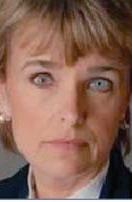
“I couldn’t believe it! I floored it to get to the office as fast as I could. As soon as I hit the door I started shouting that we needed to turn the radio on. Everyone gathered around the radio in utter disbelief. Some people cried, others broke out the cigars. We were all overjoyed, to put it mildly.”
The joy and exultation did not last. A year later, the court issued another order requiring U.S. schools desegregate “with
The recent unveiling of a statue honoring civil rights activist and journalist Daisy Bates in the National Statuary Hall brought out a bipartisan mix of individuals who praised the icon and the newest fixture at the U.S. Capitol.
Arkansas Republican Congressman Bruce Westerman reflected on Mrs. Bates’ early life challenges, while the man who created the statue praised her courage. Democratic members of Congress also chimed in, noting the historic installation and acknowledgment of Mrs. Bates’ activism.
all deliberate speed” a phrase Mr. Hill said came to mean “somewhere between now and all eternity.” He noted the decision helped open the doors to higher education, but that K-12 public education continues to suffer from segregated schools, the only real difference being that
“we have moved from de jure to de facto segregation.”
At age 97, Mr. Hill admitted it pained him to accept that he had “little hope” that our nation’s K-12 public education system would be desegregated in his lifetime.
It was his contention that nowhere in this country were the negative effects of segregation as vivid and ingrained as they were in Richmond, the former Capitol of the Confed-
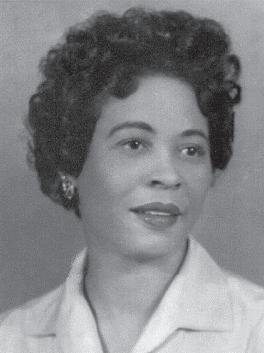
“Considering the current climate that we’re in as it relates to politics and race, it’s important that we remind people of our history,” Texas Democratic Rep. Jasmine Crockett said last week. I think we need to consistently remind people of our history and what really matters. And hopefully, we can find it in our hearts to recognize

eracy and birthplace of Massive Resistance. Mr. Hill had harsh words for local newspapers and for the business leaders and elected officials who bounce from one civic boondoggle to another, all the while promising that proceeds from the projects will be used to help improve Richmond’s public schools.
“Never happens,” he said, adding that, “If the members of the clergy who give cover to the greed of the business leaders would only decide to demand legislators make our city school
facilities models of excellence, our city would benefit financially and morally.”
He believed in accountability and responsibility. “Were the citizens of the city and the parents — Black and white — to unite and demand the politicians stop giving excuses and instead give our children the schools they deserve,” he said, “there would be no need to throw tax abatements at companies to get them to come here. We would have an educated population of young people who could go to
the future historians doing their part to better this country.”
Because of her prominent role in integration, Mrs. Bates was often a target for intimidation, with rocks thrown at her home, bullet shells sent to her mailbox and threats that forced her family to shut down their newspaper.
Mrs. Bates, who died in 1999 at age 84, played a crucial role in desegregating Arkansas public schools in the 1950s.
Along with her husband, she published an Arkansas newspaper dedicated to the civil rights cause and served as the president of the state’s NAACP chapter. “Every high school, every middle school, every elementary school, every college in this country is the pattern of America today because of Daisy Gaston Bates,” remarked Charles King, president of the Daisy Bates House Museum Foundation, during the unveiling ceremony.


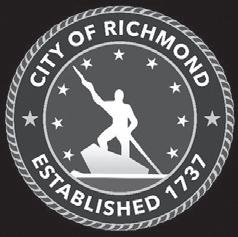
The City of Richmond announces the following project(s) available for
Bid Due Date: Wednesday, June 12, 2024, Time: 2:00 P.M.
Information or copies of the above solicitations are available by contacting Procurement Services, at the City of Richmond website (www.RVA. GOV). The City of

The City of Richmond announces the following project(s) available for services relating to: RFP - 240009062 Disability Insurance
For all information pertaining to this RFP, please logon to the Richmond website (www.RVA.GOV).
Bid Due Date: June 10, 2024/Time: 11:00 AM
Pre-Bid Meeting: May 22, 2024/Time: 11:00 AM
Information or copies of the above solicitations are available by contacting Procurement Services, at the City of Richmond website (www.RVA.GOV) or faxed (804) 646-5989. The City of Richmond encourages all contractors to participate in the procurement process.
any college they wanted to, a population that could not only take jobs in those companies, but create new businesses and new jobs.”
So, 70 years after the landmark decision and 20 years after the afternoon Mr. Hill talked about his disappointment that the Brown decision had not really done much to improve our nation’s K-12 schools, where are we?
“The fight for equality and equity must continue long after I and the others who led the charge are long gone. If you get tired of the fight — and you will — you must remember to take the long view and understand that eventually, evolution will take care of this ... ”
“Evolution, Mr. Hill?!”, I interjected. “Evolution?!” He answered, “Yes ... it does tend to be so damn slow, now don’t it?”
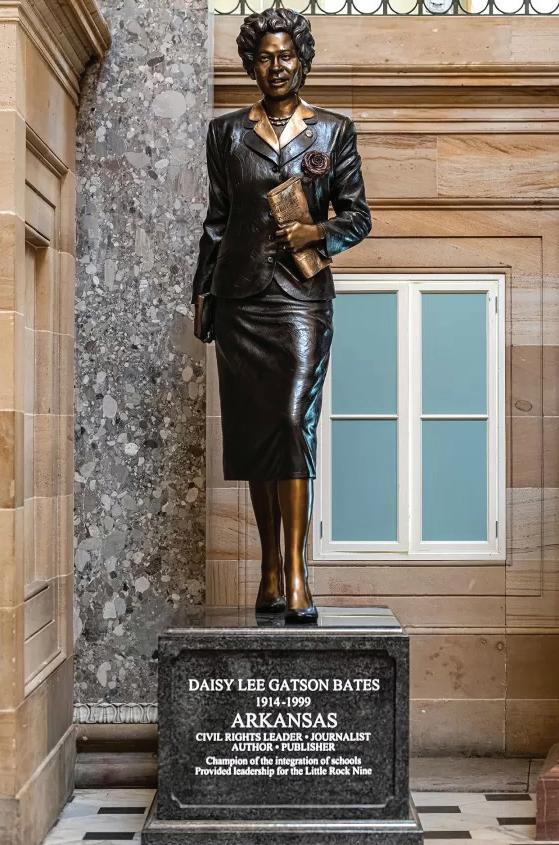

Eastridge Road & N. Parham Road Phase 3 Sidewalks County of Henrico, Virginia
Notice of Willingness to Hold a Public Hearing
The County of Henrico proposes constructing two sidewalk projects along Eastridge and N. Parham Roads. The Eastridge Road project will add approximately 250 feet of sidewalk along the northern side of Eastridge Road east of N. Parham Road connecting existing sidewalk, 40-feet of sidewalk along the southern side of Eastridge Road connecting existing sidewalk, and 2 pedestrian signals/ crossings. The N. Parham Road Sidewalk, Phase 3 project will install approximately 1,100 linear feet of concrete sidewalk along the western side of N. Parham Road from Holly Hill Road to Weldon Drive. Construction is currently anticipated for 2025. Information related to these projects including the proposed sidewalk addition, project schedule, and funding information can be reviewed by appointment at the County of Henrico, Department of Public Works, 4305 E. Parham Road, Henrico, VA 23228, Telephone: (804) 501-4687. Project information is also available online at the following addresses: https://henrico.us/projects/eastridge-rd-sidewalk/ https://henrico.us/projects/n-parham-rd-sidewalk-3/
public hearing. You may request a public hearing by sending a written request to Charley Sessoms, P.E., County of Henrico, Department of Public Works, Transportation Development Division, P. O. Box 90775, Henrico, VA 23273-0775, on or before May 31, 2024. If a request for a public hearing is received, notice of the date, time, and place of the public hearing will be provided.
The County ensures nondiscrimination and equal employment in all programs and activities in accordance with Title VI and Title VII of the Civil Rights Act of 1964. If you need more information or special contact Charley Sessoms at the above address or phone number or at ses016@henrico.us.
N. Parham Road Sidewalk, Phase 3
UPC: 117051
Project: VDOT #7518-043-R86
Eastridge Road Sidewalk UPC: 117056
Project: VDOT # 9999-043-991
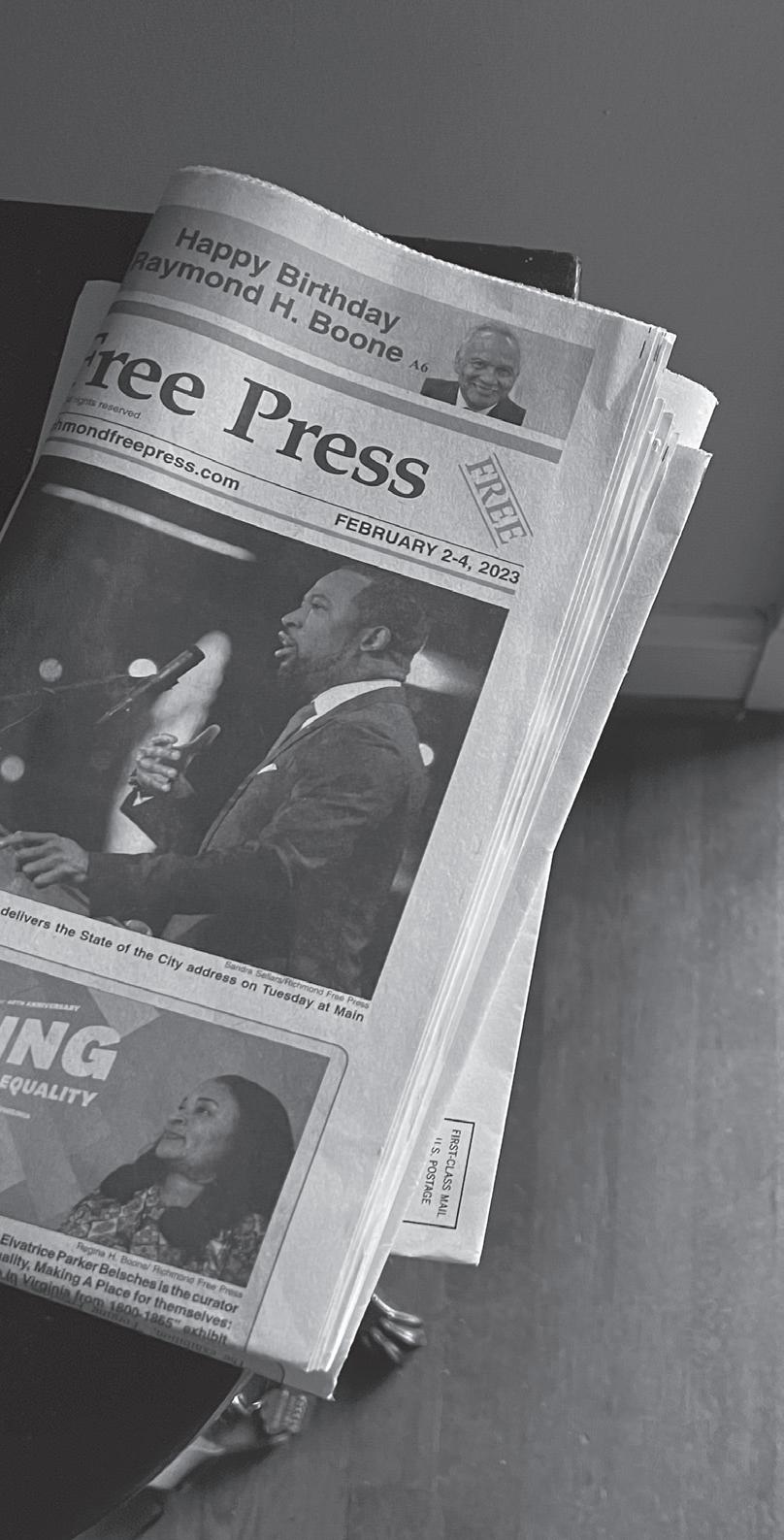

The floundering Richmond Flying Squirrels are hopeful the friendly confines of The Diamond will help them snap out of their prolonged slump.
Jairo Pomares’ left-handed bat may help.
The Squirrels returned home this week following a grinding two-city, 12-game road trip that resulted in 11 losses in 12 tries. Richmond finished the road trip 12-21 overall.
Pomares, elevated from Eugene, Ore., on May 4, provided a rare highlight May 11 with his first AA home run in a loss at Erie. The native Cuban signed with San Francisco for $975,000 in 2018 and has slowly worked his way through the Giants’ farm system. Before joining Richmond, Pomares had 41 home runs, 166 runs batted in and a .301 career average. While victories have been hard to come by, the franchise’s box office is booming. In their first 12 openings, the Squirrels averaged more than 7,100 fans, by far the best in the Eastern League.

Squirrels back in the nest
The Richmond Flying Squirrels play the Reading, Pa., Fightin’ Phils, AA affiliate of the Philadelphia Phillies, at The Diamond for several games this week.
Thursday, May 16, 6:35 p.m. Fireworks
Friday, May 17, 12:05 p.m. RVA Day
Saturday, May 18, 6:05 p.m. Fireworks
Sunday, May 19, 1:35 p.m. Towel giveaway Tickets: SquirrelsBaseball.com/Tickets; or 804-359-3866.
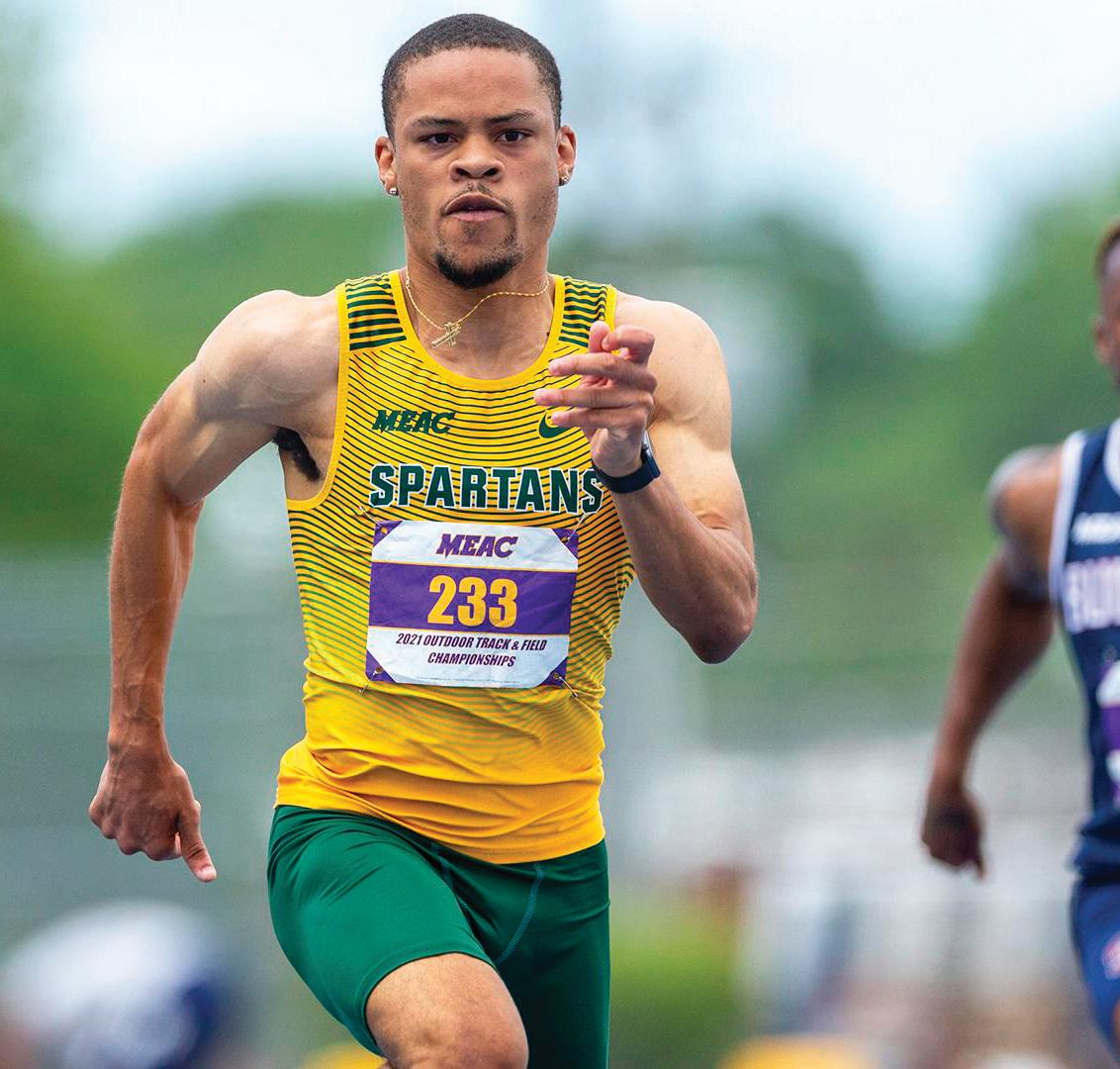
With four quality athletes to choose from, who will Coach Alvin Parker pick to be Virginia Union University’s starting quarterback?
“We feel very good about it,” Coach Parker said of his candidates. “All played well during the spring, and all played in our scrimmage with Virginia State.
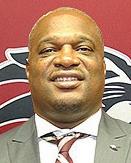
“They’ll be working throughout the summer to compete for the starting job.”
These are happy times around Hovey Field.
The Panthers are coming off a 10-2 season in which they won their first CIAA crown in 22 years and then went to the NCAA Division II playoffs.
Nine starters return on defense and eight on offense. But what about QB? Among the graduates is last year’s leading man, Christian Reid, who passed for 1,501 yards and 13 touchdowns.
Reid offered a steady hand week after week, never spectacular but always keeping the team on course. If there is a leader in the clubhouse to succeed Reid, it would be fleet junior RJ Rosales, the top backup a year ago.
The 5-foot-8, 180-pound native Floridian passed for 301 yards and four TDs while also rushing 20

times for 130 yards and four scores.
Well-traveled Mark Wright, a 5-foot-10, 195pound native of Atlanta, previously played at Hutchinson Community College, Kan., and at Virginia State.
As a Trojan in 2021, he played three games and passed for 363 yards. In 2019 at Hutchinson, Wright tossed for 1,831 yards and 20 TDs.
Jonathan “Myles” Derricott is a 6-foot-3, 175pound former Varina High standout, who sat out last season at VUU as a redshirt. Derricott is the nephew of Daninelle Derricott, who quarterbacked Patrick Henry to the 1994 State Division 5 title.

Panther’s passers
Here are the starting quarterbacks for Virginia Union during Coach Alvin Parker’s tenure on Lombardy Street.
2024 To be determined

Derricott led Varina to the Class 4 state title in the fall of 2021 and was a member of the Blue Devils’ state championship basketball team in 2022.
HBCU’s will be represented at the upcoming Olympic Track and Field Trials. Norfolk State’s Kai Cole has punched his ticket to the trials while also drawing the attention of world champ Noah Lyles.
“I see ya Kai!” Lyles posted on X after hearing of Cole’s heroics.
Lyles is the reigning world champ in the 100 meters and among the favorites to prevail at the Summer Games in Paris.
Cole is a 5-foot-5 graduate student at Norfolk State University.
Competing at the MEAC Championships last week at Dick Price Stadium in Norfolk, Cole won the 100 in 10.05 and 200 in 20.55, qualifying for the trials in both events. Cole’s 10.05 for the 100 ranks among the 10 fastest times run by any American this year.
Aside from speed, Lyles and Cole have something else in common. Both are graduates of T.C. Williams High, the Alexandria school made famous in the sports film,
“Remember the Titans.”
The Trials will be June 21 to 30 at the University of Oregon. The Olympics will be July 26 through Aug. 11 in Paris.
Should Cole qualify for Paris, he won’t be the first Spartan to do so. In 1976, NSU alumnus Steve Riddick won the gold medal in Montreal for the 4-x-100 relay.

Like Derricott, Tayvon Tyler was redshirted in 2023. Before that the 6-foot-4, 185-pounder starred at Woodside High in Newport News, earning numerous postseason accolades.
Under Coach Parker, VUU has become a dominant program in the CIAA and a perennial challenger for NCAA playoff honors.
Since coming aboard in 2018, Coach Parker’s Panthers are 40-13 overall and 29-7 in CIAA. They will likely be the preseason pick to take top honors in 2024. There will be no more Northern and Southern


Divisions of the CIAA. Starting this season, all 11 football-playing members will be grouped in the same standings. The top two, regardless of location, will meet in Salem for the CIAA crown. This marks the final year of the CIAA’s contract with Salem. St. Augustine’s will remain in the CIAA for other sports but will no longer compete in football. The Falcons were 0-10 last year and have been 2-26 since the 2020 season was lost to pandemic restrictions. Neither Virginia Union nor Virginia State were scheduled to play the Raleigh school this fall.
Blink, and you might miss the next basketball player transferring from or into the VCU.
Due to the school transfer portal and NIL revenue bidding, college hoops have become a topsy-turvy world and the Rams have been smack dab in the middle of it.
Here’s some background: In Coach Ryan Odom’s first season, a Rams’ roster rebuilt from the year before went 24-4, reached the A-10 tournament final and advanced to the NIT quarterfinals.
Since then, here are the additions:
• Jack Clark, 6-foot-10, is coming to VCU as a graduate student after pit stops at LaSalle, North Carolina State and Clemson.
season will be 6-foot-7 sophomore Alphonzo
Billups from Varina, 6-foot-6 sophomore Michael Belle from London, 6-foot-10 Christian Fermin from Pennsylvania, 6-foot-5 senior Zeb Jackson and 6-foot-4 senior Joe Bamisile.
Jackson will be in his third VCU season after transferring from Michigan. Bamisile, out of Monacan High, will be in his second Rams’season after stops at Virginia Tech, George Washington and Oklahoma.
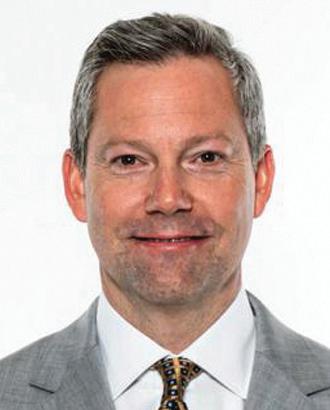
• Phillip Russell, 5-foot-11, chose to finish his career at VCU as a grad student following one season at St. Louis, two at Southeastern Missouri and this past season at University of Texas-Arlington.
• Terrence Hill, 6-foot-3, incoming freshman, first committed to Utah State (Odom’s previous school) before opting for VCU. He’s from Portland, Ore., but played high school ball in Chandler, Ariz.
False alarm: VCU felt it had a commitment from Jamarii Thomas, the MEAC Player of Year from Norfolk State. However, after about a week Thomas changed his mind and will enroll at South Carolina. Returning Rams: Coming back for another
En route: Brandon Jennings, a 6-foot-3 guard who earned Richmond Metro Player of year honors at St. Christopher’s. Jennings signed with the Rams early last winter. Also, 6-foot-9 Obi Okafor from Hampton is expected to join the action after two red-shirt seasons.
Gone: All-Atlantic 10 guard Max Shulga transfers to Villanova as a graduate student.
High-rising Tobi Lawal, among the NCAA’s leaders in shooting percentage and dunks, transfers to Virginia Tech as a junior.
Jason Nelson, junior guard out of John Marshall, transfers to Youngstown State, Ohio. Also out of JM, Roosevelt Wheeler, a senior, transfers to East Tennessee.
Players Kuany Kuany and Sean Bairstow finished their college eligibility.
The NCAA allows 13 scholarships. The Rams are at 10 and counting. Expect anything written about the Rams squad on Sunday might be outdated by Monday.
Chesterfield County officials announced plans to establish a sports hall of fame during a press conference held at the River City Sportsplex on May 14. The newly formed Chesterfield County Sports Hall of Fame aims to recognize outstanding individuals, including coaches, teams and sports contributors, who have significantly impacted Chesterfield County’s sports history and legacy, according to a press release.
Sept. 12 at the Perkinson Center for the Arts and Education in Chester.
The hall of fame will be housed at the River City Sportsplex, a sporting facility in the county. Nominations for induction into the hall of fame will be accepted until July 1. The selection process will culminate in a formal banquet on
The hall began accepting nominations this week. Detailed information regarding nomination qualifications and procedures can be found on the official website of the Chesterfield County Sports Hall of Fame: playchesterfield.com/ sports-hall-of-fame.

Dr. Antonio Villa Payares was part of the first generation in his family to pursue a career in medicine. He became interested in becoming a doctor early on.
“At first, as a child, I admired those professionals and the role they (play) in society,” Dr. Villa Payares said. “Then in high school, I wanted to do something important that I enjoyed while helping other people.”
Dr. Villa Payares’ father was the most important influence in his life. He admired his integrity and moral principles, as well as how he showed up for his family and friends. His father also demonstrated how to treat others the way you want to be treated.
“He inspired me to be independent and work for anything that I want to achieve in my life,” Dr. Villa Payares said.
As a primary care physician, Dr. Villa Payares noticed how much he could impact other people’s lives. He also realized that he could do more for his community, especially through preventative medicine.
Today, Dr. Villa Payares makes an impact through his
work and his nonprofit, La Casa de la Salud. Founded in 2014, the organization works to improve the health of the Hispanic community.
La Casa de la Salud has about 30 volunteers who are mostly community health workers. The organization also has a few contractors and staff who also volunteer their efforts. The organization’s volunteers also work on events and activities in the community.
La Casa de la Salud is expanding to localities such as Virginia Beach and Harrisonburg to collaborate with other health organizations. The goal for the organization’s expansion is not to duplicate but to supplement the work that the localities need in public health, especially with the activities the organization has for the community, Dr. Villa Payares said. Meet the founder and executive director of La Casa de la Salud and this week’s Personality, Dr. Antonio Villa Payares:
Occupation: Medical doctor and executive director of La Casa de la Salud.
Date and place of birth: Nov. 28 in Pivijay, Colombia.
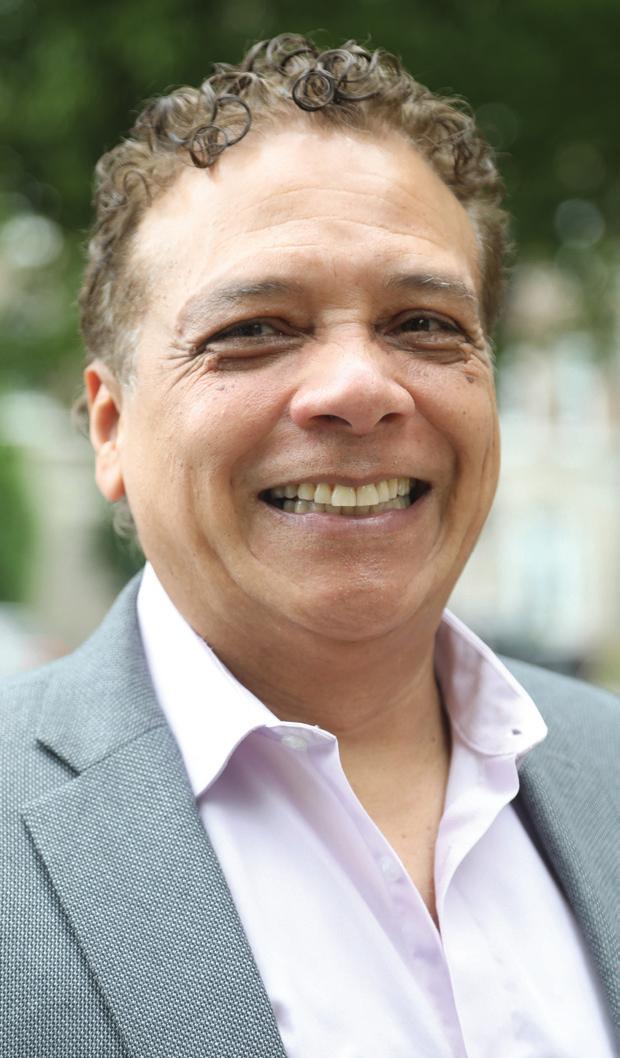
Education: Medical doctor with master’s in public health and management.
Family: I came from Colombia in 2004 with my wife and three sons. My wife is a dentist and used to work in the community, too. Two of my sons are pursuing bachelor’s degrees and the other works as a mechanical engineer.
La Casa de la Salud (LCS) is: A nonprofit organization founded in 2014.
When and why I founded: It was my Capstone project from my MPH at VCU in December 2013. We launched it as an initiative in the city of Petersburg in February 2014 and four months later I registered it as a 501(c)(3). I noticed the great limitation that Hispanics and other immigrants had accessing health information, health services and clinical preventive services.
How LCS works: LCS serves as a bridge facilitating health and other information resources as well as education to preserve individuals and the Hispanic community’s health and wellbeing. We identify gaps or organizational barriers that prevent individuals from obtaining health and other social services.
How is LCS funded: LCS is funded by federal and state government funds as well as local foundations through grants. There is a small amount from individual donations which we are working on increasing through a plan to obtain more contributions
to expand our capacity and response.
LCS’ No. 1 goal or project: One of our main priorities for this year is to strengthen collaborations with health systems, clinics and other key partners to address together the needs of our community.
Strategy for achieving goals: Having a clear understanding of the dynamics and needs of our community.
No. 1 challenge: LCS has been growing fast and we are in the transition to strengthen its structures which is critical for our sustainability, however we are hoping to have good support from local organizations, partners and donors.
Ways I have witnessed the magic of LCS: This journey has been a great learning opportunity to confirm that we can influence others to generate great impact with simplicity. There are people who are looking for ways to help others, but they do not know how to do it and this movement has been witness to it.
How to help or get help with LCS: Volunteers can call (804) 404-5633 or email




lacasadelasalud.org.
LCS partners with: We have a partnership with health systems, clinics, local health departments and other partners with other social services or resources. Working together to create synergy and achieve our goals.
How I start the day: With a coffee with my wife, followed by 30 to 40 minutes of physical and mental exercise.
Words that best describe me: Persistent, open-minded.
Best late-night snack: An orange or apple.
A quote that inspires me:
“Don’t worry about failure; you only have to be right once.”— Drew Houston
The best thing my parents ever taught me: Honesty with other people.
The person who influenced me the most: My padre.
Book that influenced me the most: “One Hundred Years of Solitude” by Gabriel García Márquez
Next goal: Expand our movement by engaging other people for healthy communities, facilitating information and providing tools to take care of themselves and others.
Dominion Energy Riverrock, an annual outdoor sports and music festival, returns this week with a new layout and an expanded footprint. This year’s festival, based at Brown’s Island, also will include Kanawha Plaza.
“As Richmond evolves, the Dominion Energy Riverrock landscape does too,” said Meghan Keogh, event director for Dominion Energy Riverrock. “This keeps us on our toes, and we think the yearly changes are part of what makes this iconic festival fun!”
The plaza will be the site of popular events such as Boulder Bash, Speed Comp, and Slackline Trickline, alongside food and beverage vendors. Organizers cited Kanawha Plaza’s proximity to Brown’s Island and the James River as enhancing the festival experience.
The festival, held May 17 through 19, also will feature over 40 outdoor vendors and sponsor activations, including Bold Rock
and Athletic Brewing offering free beverage sampling and Hardywood Park Craft Brewery brewing a special beer, Hardywood Riverrock Pale Ale.
Some of this year’s performers include Sam Reed and Love Jones, Karl Denson’s Tiny Universe, Night Ideas and Rumble Trio, among others.
Since its inception in 2009, Dominion Energy Riverrock has grown to become a prominent outdoor sports and music festival, drawing attendees to Richmond’s urban riverfront. The event aims to promote outdoor recreation opportunities in the region and foster appreciation for outdoor activity.
Organized by nonprofit groups Sports Backers and Venture Richmond, Dominion Energy Riverrock 2024 is free for all spectators. More information, including the full music schedule, can be found on the festival’s website, riverrockrva.com, or social media.
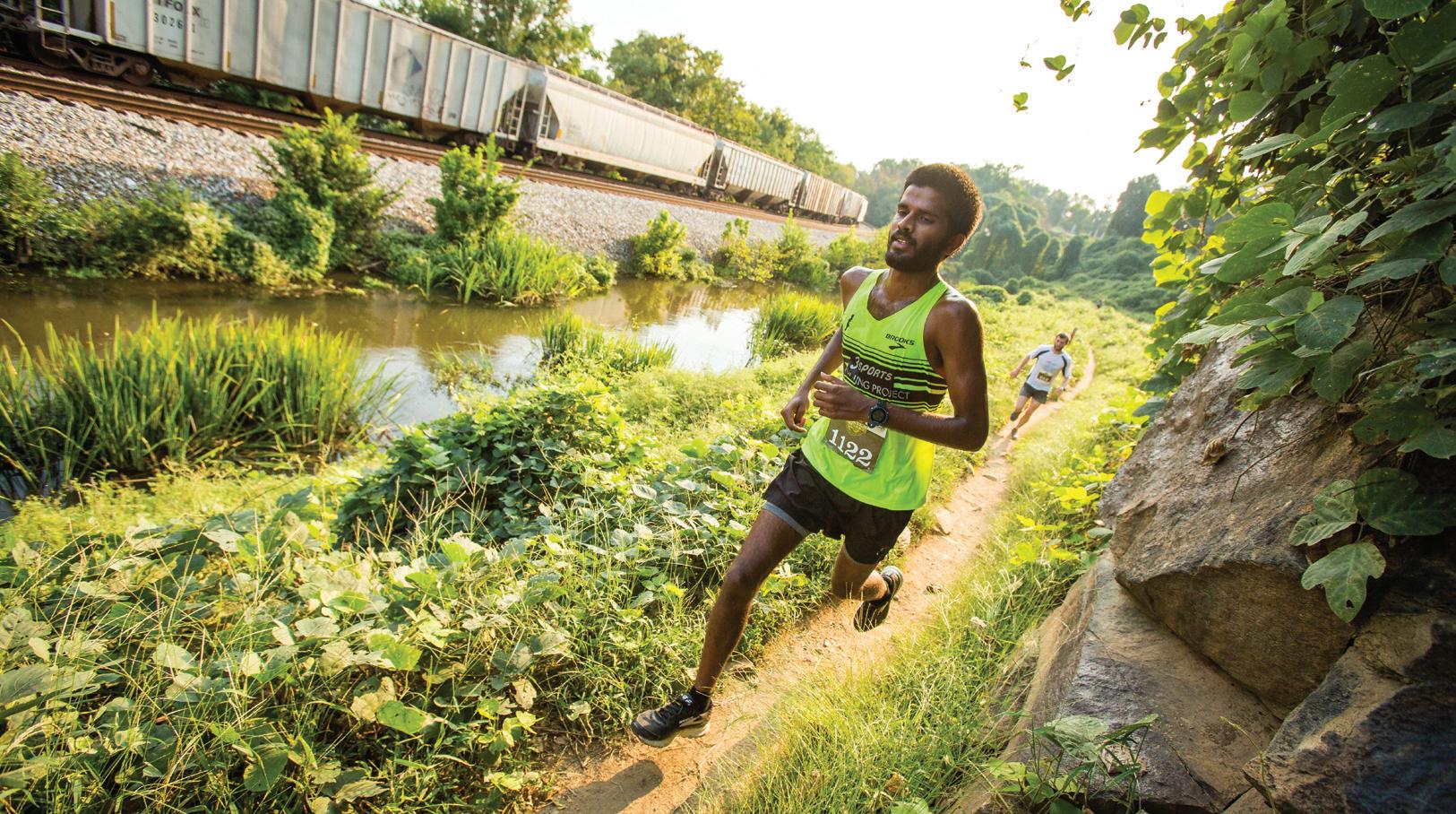
In a culmination of a three-part series exploring the intricate relationship between race and mental health, Coming Together Virginia presents its Tuesday Dinner Gathering on May 21 at 6 p.m. at Ginter Park Presbyterian Church. This event features guest speaker Dr. Shawn Utsey, a professor in the Department of Psychology at Virginia Commonwealth University.
Dr. Utsey will present excerpts from his 2022 documentary “The Central Lunatic Asylum for the Colored Insane.” This

film delves into the complex history of the United States’ first psychiatric facility for AfricanAmericans, shedding light on its evolution amidst the backdrop of scientific racism and racial disparities in mental health treatment.
This catered dinner gathering promises not only a nourishing meal but also an
intellectually stimulating exchange of ideas. Contributions of $20 per person are accepted to help cover expenses. Coming Together Virginia is a local nonprofit organization that typically unites people over a meal to have challenging conversations.
“No one will be turned away,” a statement from the group reads. “So please come regardless of your ability to bring a dish or make a donation. We appreciate your voice and spirit contributing to our conversations!”
The Library of Virginia will host a “Knit In Public Day at LVA” on Saturday, June 8, in honor of the annual Worldwide Knit in Public Day. The event will run from 10 a.m. to 2 p.m. in the library’s lobby and conference rooms. Worldwide Knit in Public Day, observed every second Saturday in June, serves as a global invitation for knitters to engage in their craft in public spaces. The event aims to promote knitting as a social activity and facilitate skill-sharing among participants.
Knitting enthusiasts are encouraged to bring their ongoing projects to the “Knit In Public Day at LVA.” Activities will include listening to knittingrelated lectures, exploring displays featuring historic knitting patterns and contemporary fiber craft items from the Library’s collections, and watching live
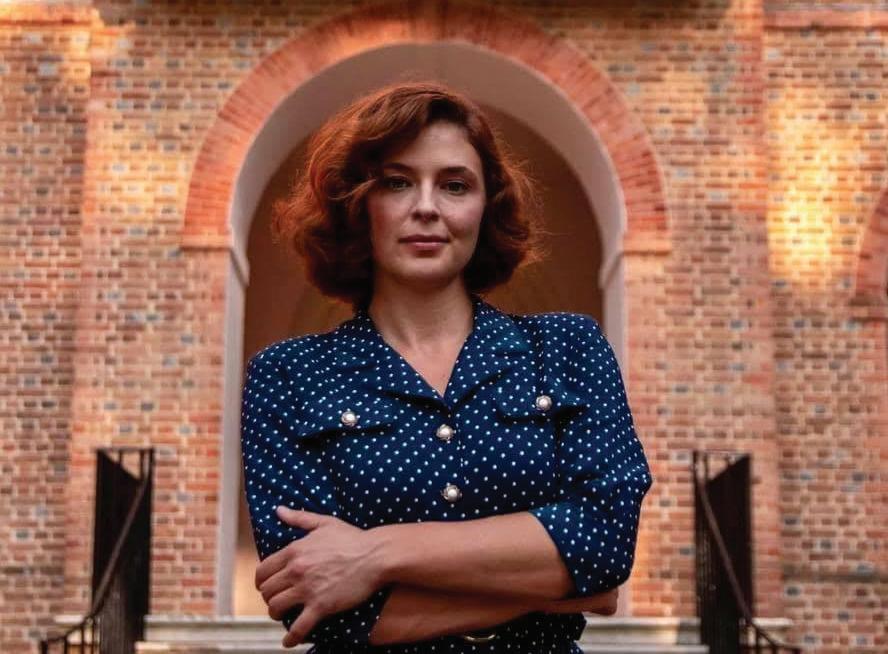
Nicole Brown will present a lecture titled “Instructing them in sewing&c: Black Girls, Knitting, and the Williamsburg Bray School” at the event.
demonstrations. Refreshments will be provided, and visitors can enter to win door prizes from Richmond area yarn shops. The event will feature two lectures, both of which will be livestreamed for virtual view-
The River City String Quartet performs under a canopy of trees as hundreds of people gathered in Bryan Park for the Richmond Symphony Mile of Music Concert last Saturday, May 11. The free outdoor mini concerts consisted of five tents spread along a one-mile route through the park. The warm weather made it enjoyable for listeners to hear the quartets and quintets of brass, string and woodwind instruments.
Black History Museum to host film screenings in honor of Brown v. Board
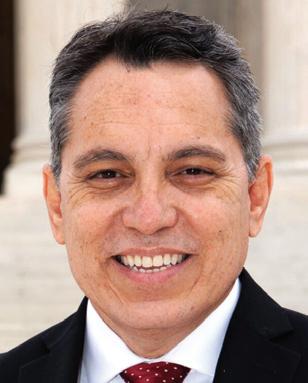
from “A Tale of Two Cities.” At 1 p.m., Nicole Brown will discuss “Instructing them in sewing &c: Black Girls, Knitting, and the Williamsburg Bray School,” exploring the historical significance of knitting in the education of Black children in the United States.
Additionally, visitors can download a digital copy of “Little Red Riding Hood’s Knitting Book” (1923) from the Library’s collection, offering insights into vintage knitting patterns and techniques.
For more information, please contact Nan Carmack at nan. carmack@lva.virginia.gov or call (804) 692-3762.
Marking the 70th anniversary of the landmark Supreme Court decision in Brown v. Board of Education, the Black History Museum and Cultural Center of Virginia will host a special event titled “Our Past, Our Present, Our Future.” Organized by SCORE in Communities, a nonprofit organization focused on education, the event aims to commemorate the pivotal ruling and its enduring impact on American society. Set for Friday, May 17, the program will feature screenings of two mini documentaries: “On the Backs of Giants: The Story of Brown v. Board” and “Desegregation: Stories of Integration of Henrico Public Schools.” These films delve into the historical context and narratives surrounding desegregation efforts, shedding light on the challenges and progress made in the pursuit of educational equality. Highlighting the event will be David Hinojosa, director of the educational opportunities project at the Lawyers’ Committee for Civil Rights Under Law. Mr. Hinojosa has a national reputation as a leading litigator and advocate in civil rights, particularly in educational impact litigation and policy. Seating will begin at 10:30 a.m. for the program, which lasts from 11 a.m. to 1 p.m. Registration is mandatory for participation and can be completed through Eventbrite.

WWW.WALLERJEWELRY.COM

ers. At 11 a.m., KT Vaughan will present “Knit Like Defarge: Encoding Meaning Into Your Stitches,” examining the literary connections of knitting, particularly inspired by characters such as Madame Defarge





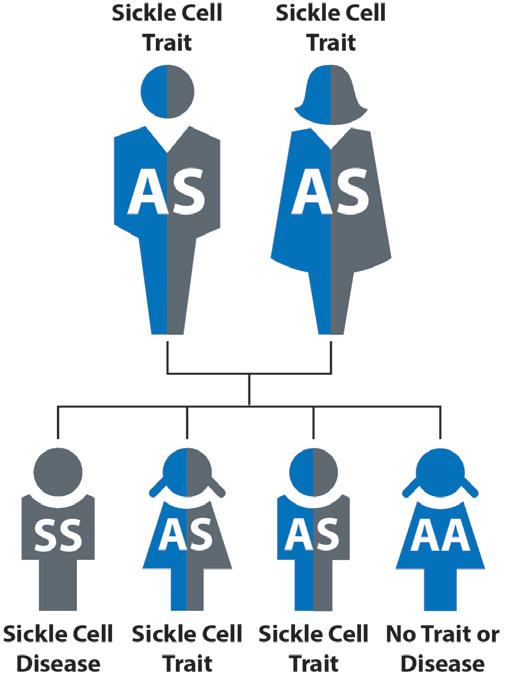
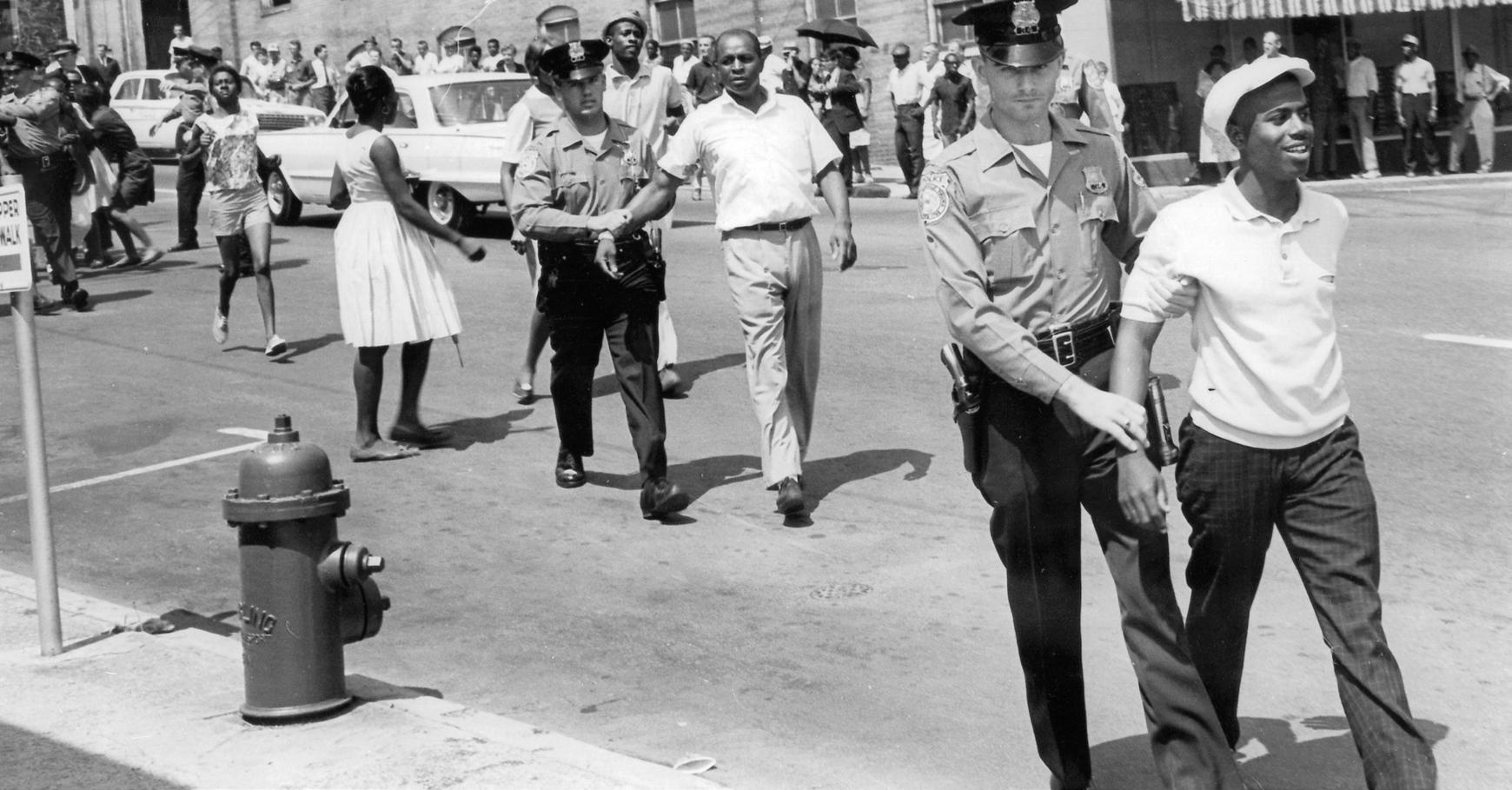
Thurs., June 6 | 5:30 to 8:30 p.m. at the Library of Virginia Registration is required: lva-virginia.libcal.com/event/12269413


With a bachelor’s degree from Virginia Commonwealth University’s School of Nursing, Erin Norwood is ready to help others — and set an example along the way.
Ms. Norwood is the first differently abled to graduate from the school’s accelerated bachelor’s program, and she hopes to raise awareness that people with disabilities can thrive as health care professionals if given the opportunity. Her journey also has been framed by faith and family.
Throughout her life, Ms. Norwood has volunteered for churches and Christian nonprofits, leading Bible studies, community outreach events and other activities. When considering careers, she knew she wanted to work in a field where she could provide the same kind of care that she fostered in church groups.
Ms. Norwood’s desire to become a nurse also stems from a more personal experience.
“My father died from a heart attack while I was in school. Looking back, he was experiencing many symptoms of heart failure. If we had recognized the signs earlier, it’s possible something could have been done to help him,” she said. “It became even more important to me to have the medical skills to help people wherever I am.”
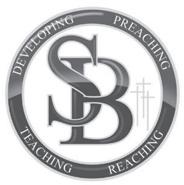
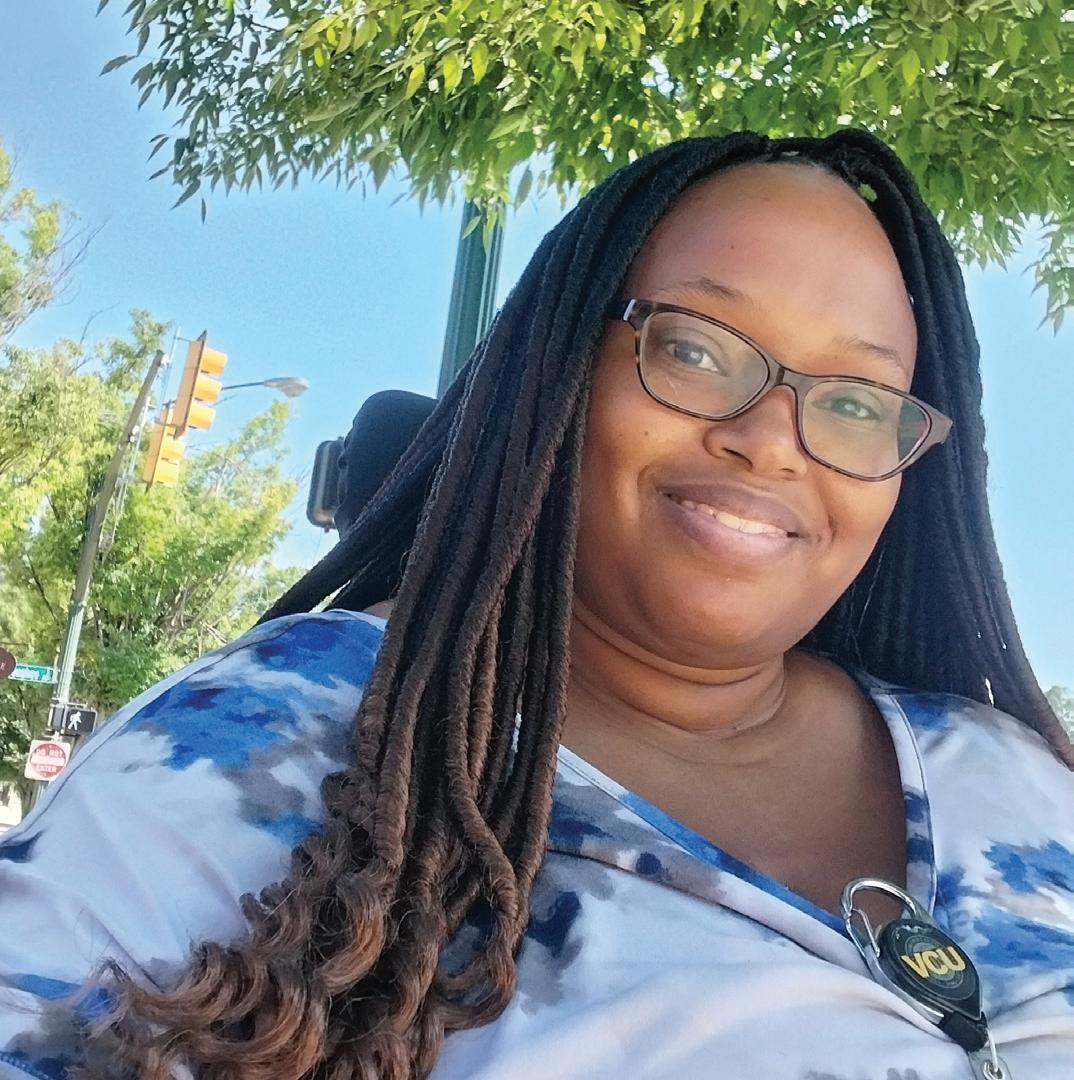
While Ms. Norwood knew she wanted a future in nursing, she faced a unique challenge compared with her classmates. For several years, she has had severe osteoarthritis, which causes extreme pain while walking.
“Typically, the farthest I can walk is from my bedroom to my kitchen, but sometimes the farthest I can walk is just to the front door of my bedroom,” she said.
Ms. Norwood first experienced arthritis in one knee while working toward her first bachelor’s degree at Morgan State University, but her pain
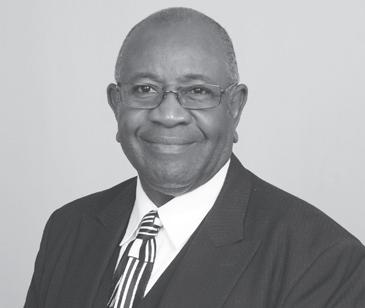
ultimately worsened over the years to the point where she began to use a walker and take medication. Now she primarily relies on a wheelchair for mobility.
Before applying to nursing schools, Ms. Norwood contacted several programs to determine whether they could accommodate her disability.
“VCU was one of the few schools to say they were willing to work with me,” she said. “Preparing for a career in nursing while bound to a wheelchair has its challenges and obstacles, but I don’t feel horrible about it because it
gives me the opportunity to prove that it can be done.”
During her nursing studies, Ms. Norwood became especially interested in pediatric intensive care unit nursing. She spent many hours volunteering at VCU Health’s Family Care Center, as well as providing support to pediatric patients and their parents on the ICU floor.
“I really love working with children, especially infants, but I also love the fact that pediatric ICUs are very team-oriented,” she said. “There are doctors, nurses, respiratory therapists and physical therapists all working together. It’s a really great atmosphere for building positive relationships and learning new skills.”
Inspired by a semester working with the Virginia Department of Health, Ms. Norwood also is considering a career in community health. With VDH, she joined various outreach projects, such as administering COVID-19 vaccines and providing food, clothing, diapers and other essentials to local underserved communities.
“There are so many factors that play a part in a person’s health and well-being, such as whether they live in a safe neighborhood, have access to healthy food, have transportation to see a provider, or can afford care or medications prescribed to them,” Ms. Norwood said. “During those
rotations, we really got to dig into what the health needs were for our local communities and what kind of plans could we come up with to help solve issues.”
Reflecting on her accomplishments at VCU, Ms. Norwood hopes more people with disabilities will pursue careers in health care and that health systems make their spaces more accommodating.
“When in nursing school, they teach you to raise a patient’s bed to waist height, but waist height for someone who can stand is not the same for someone who is in a wheelchair,” Ms. Norwood noted.
She also hopes students and staff with disabilities feel more open to talk about their experiences in the medical field to show they aren’t alone in their challenges.
As a student, Ms. Norwood

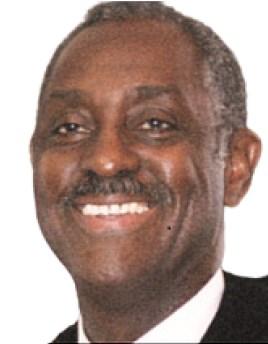
created a Facebook page to foster an online community for disabled people pursuing careers in health care. Through this group, called “Ability in Disability-Disabled Docs, Nurses, Students, & Others in Medicine,” Ms. Norwood shares motivational stories to encourage others.
“There are many people who are able to work as health professionals without being limited by their disabilities,” she said. “There are plenty of ways that we can make the health care industry more accommodating for disabled workers. It’s just a matter of believing in those ideas and a willingness to implement them.” This story originally appeared at news.vcu.edu





